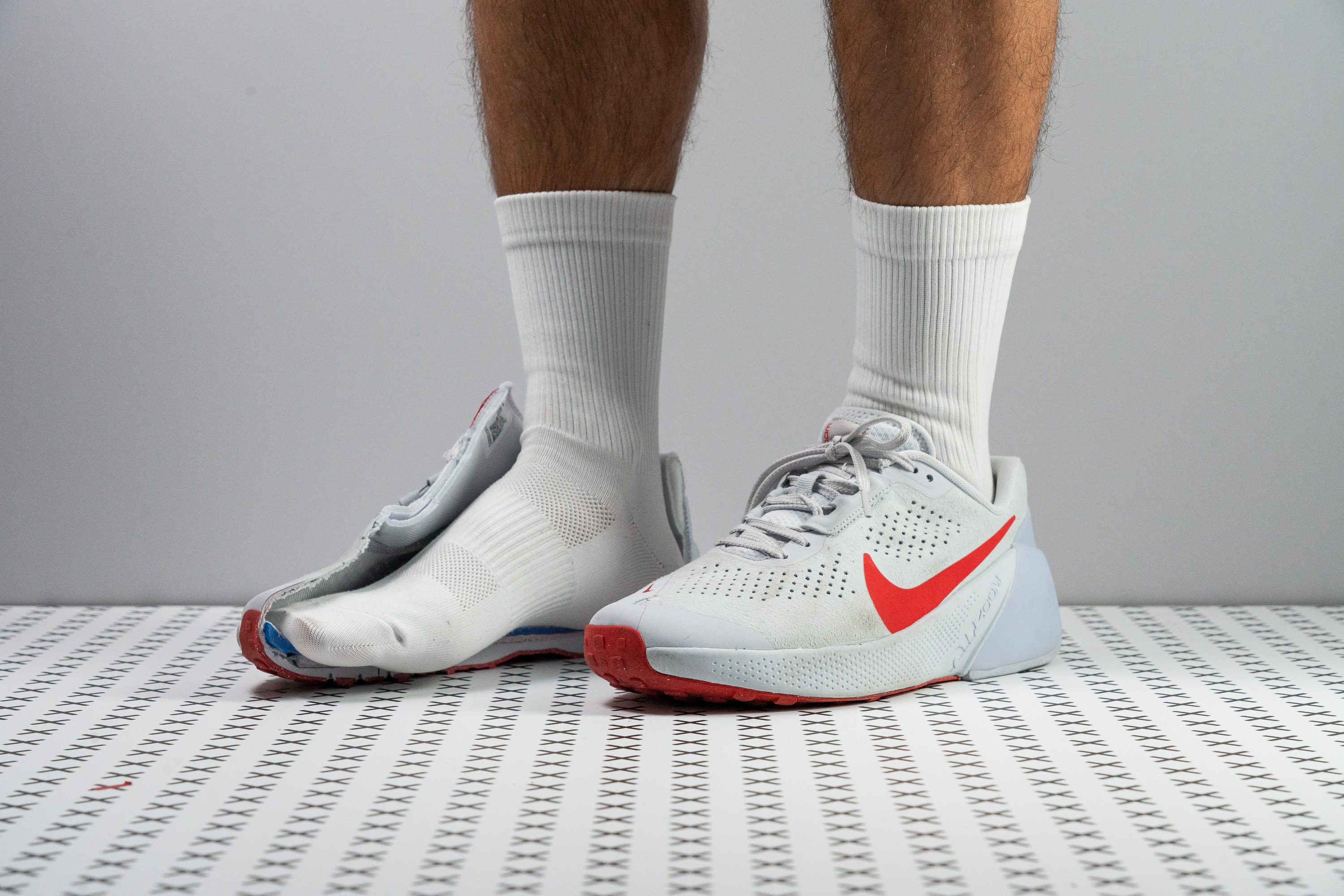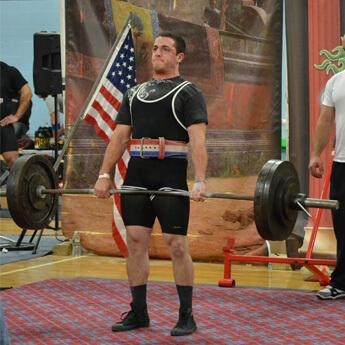Our verdict
- Top pick in best Nike workout shoes
- Top pick in best Nike gym shoes
Pros
- Dependable bite on gym floors
- Pretty durable toebox
- Good impact protection
- Nice lateral stability
- Secure heel hold
- Smooth heel-to-toe transitions
- OK for occasional outdoor use
Cons
- Not breathable at all
- Not for heavy lifting
Audience verdict
Comparison
The most similar training shoes compared
+ + Add a shoe | |||||
|---|---|---|---|---|---|
| Audience score | 86 Good! | 87 Great! | 92 Superb! | 82 Good! | |
| Price | $130 | $130 | $139 | $150 | |
| Use | CrossfitWorkoutCross-trainingGymHIITJumping ropeAll sports | CrossfitWorkoutCross-trainingGymHIITJumping ropeAll sports | CrossfitWorkoutCross-trainingGymHIITJumping ropeAll sports | CrossfitWorkoutCross-trainingGymHIITJumping rope | |
| Shock absorption | - | - | Moderate | Low | |
| Energy return | - | - | Moderate | High | |
| Traction | - | - | - | Moderate | |
| Drop lab | 3.9 mm | 4.8 mm | 4.8 mm | 7.7 mm | |
| Heel stack lab | 22.3 mm | 22.3 mm | 23.6 mm | 22.9 mm | |
| Forefoot | 18.4 mm | 17.5 mm | 18.8 mm | 15.2 mm | |
| Weight lab | 11.5 oz / 325g | 12.3 oz / 350g | 12.3 oz / 350g | 12.1 oz / 342g | |
| Breathability | Warm | Moderate | Warm | Breathable | |
| Width / fit | Medium | Narrow | Narrow | Medium | |
| Toebox width | Medium | Medium | - | Medium | |
| Size | True to size | Slightly large | Half size small | True to size | |
| Midsole softness | Balanced | Balanced | Firm | Balanced | |
| Stiffness | Stiff | Stiff | Stiff | Moderate | |
| Torsional rigidity | Moderate | Stiff | Moderate | Flexible | |
| Heel counter stiffness | Stiff | Moderate | Moderate | Moderate | |
| Toebox durability | Good | Good | - | Bad | |
| Heel padding durability | Decent | Bad | - | Decent | |
| Outsole durability | Decent | Decent | - | - | |
| Midsole width - forefoot | Average | Average | Average | Average | |
| Midsole width - heel | Average | Average | Average | Average | |
| Widths available | NormalWide | Normal | Normal | Normal | |
| Insole thickness | Average | Average | Average | ||
| Outsole thickness | Average | Average | Average | Thick | |
| Outsole hardness | Average | Average | Average | Average | |
| Heel tab | None | Finger loop | None | None | |
| Tongue: gusset type | Both sides (full) | None | None | Both sides (full) | |
| Tongue padding | Average | Average | Thin | Very thin | |
| Ranking | #21 Bottom 43% | #17 Top 46% | #4 Top 11% | #29 Bottom 21% | |
| Popularity | #14 Top 38% | #27 Bottom 27% | #26 Bottom 29% | #21 Bottom 43% |
Who should buy
We wear-tested the Nike Air Zoom TR 1. We also subjected it to several lab assessments. Based on our results, we conclude that this Nike trainer is most suitable for the following:
- busy people who only do short but pretty explosive workouts
- gymgoers who appreciate shoes with softer midsoles
- wearers who are on the lookout for durable training shoes
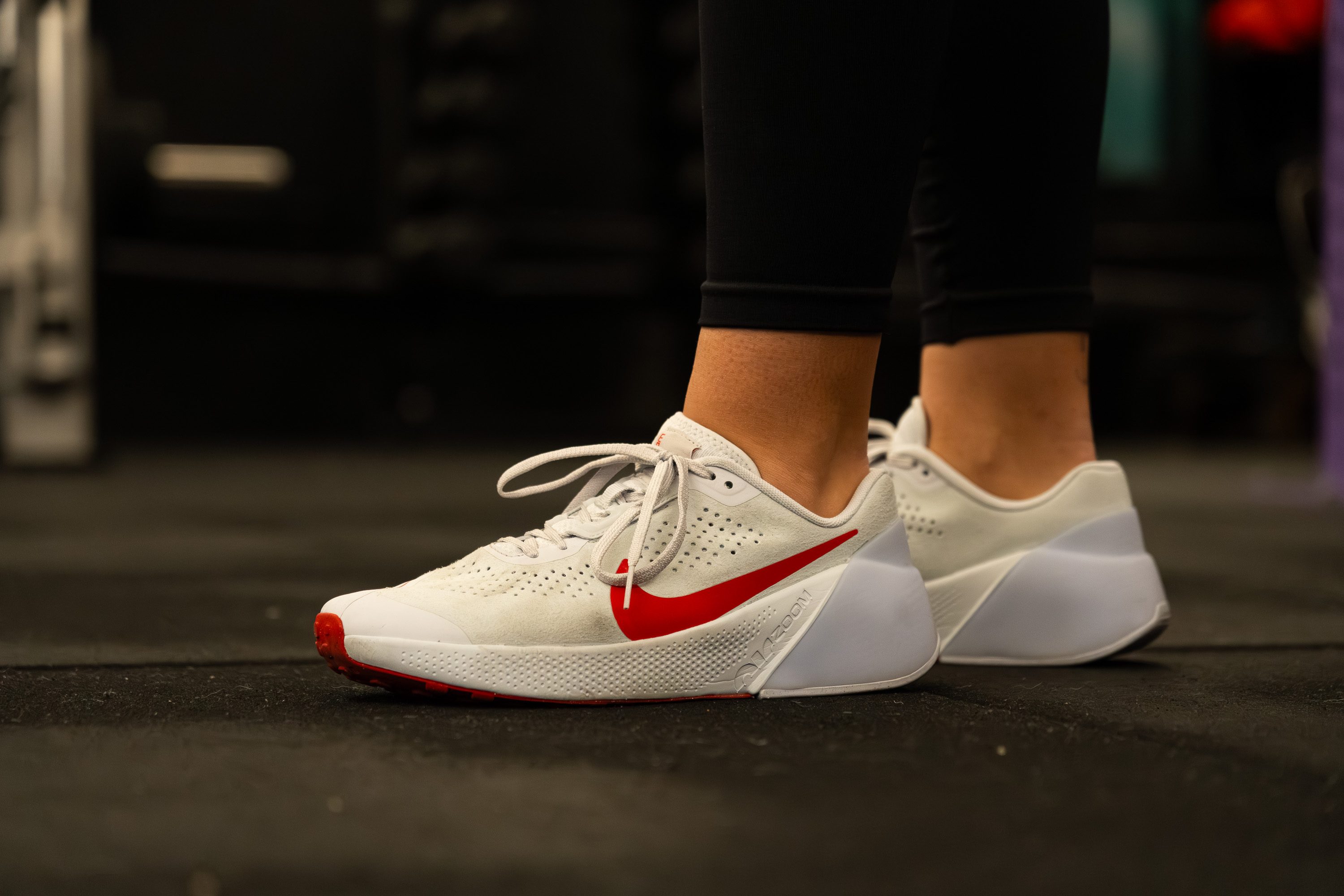
Who should NOT buy
Based on our experience, this training shoe from Nike had serious issues with breathability. Aside from the Adide Dropset 2, the Nike Zoom Metcon Turbo 2 is also a good alternative when it comes to ventilation.
It's clear to us that wide-footers are not the primary targets of the Nike Air Zoom TR 1. It simply did not offer more width than the typical trainer. We think that the Nike Metcon 9 is a better pick for wide-footers.
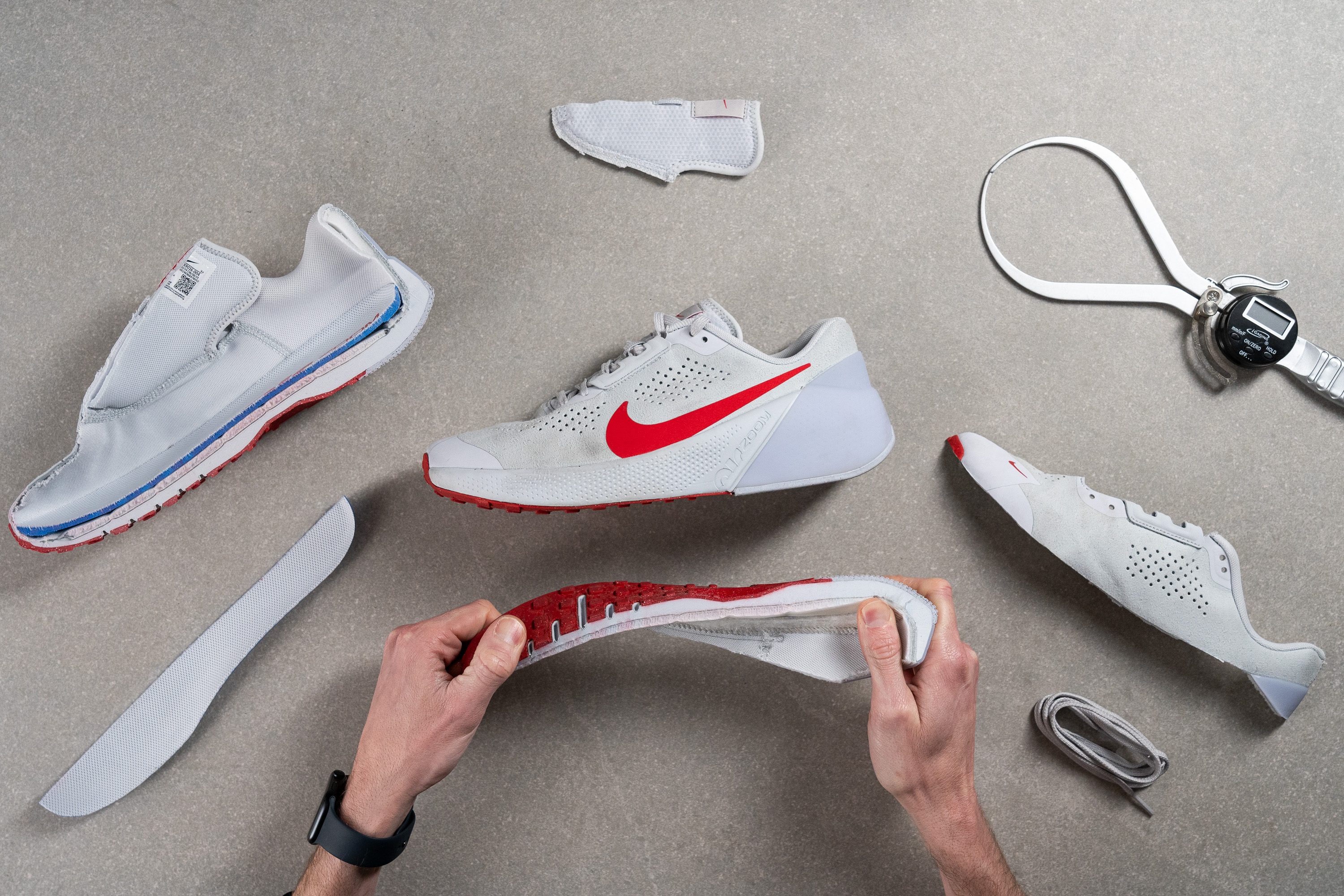
Cushioning
Heel stack
The thickness of the heel was just around the average. Our caliper measured it to be 22.3 mm thick.
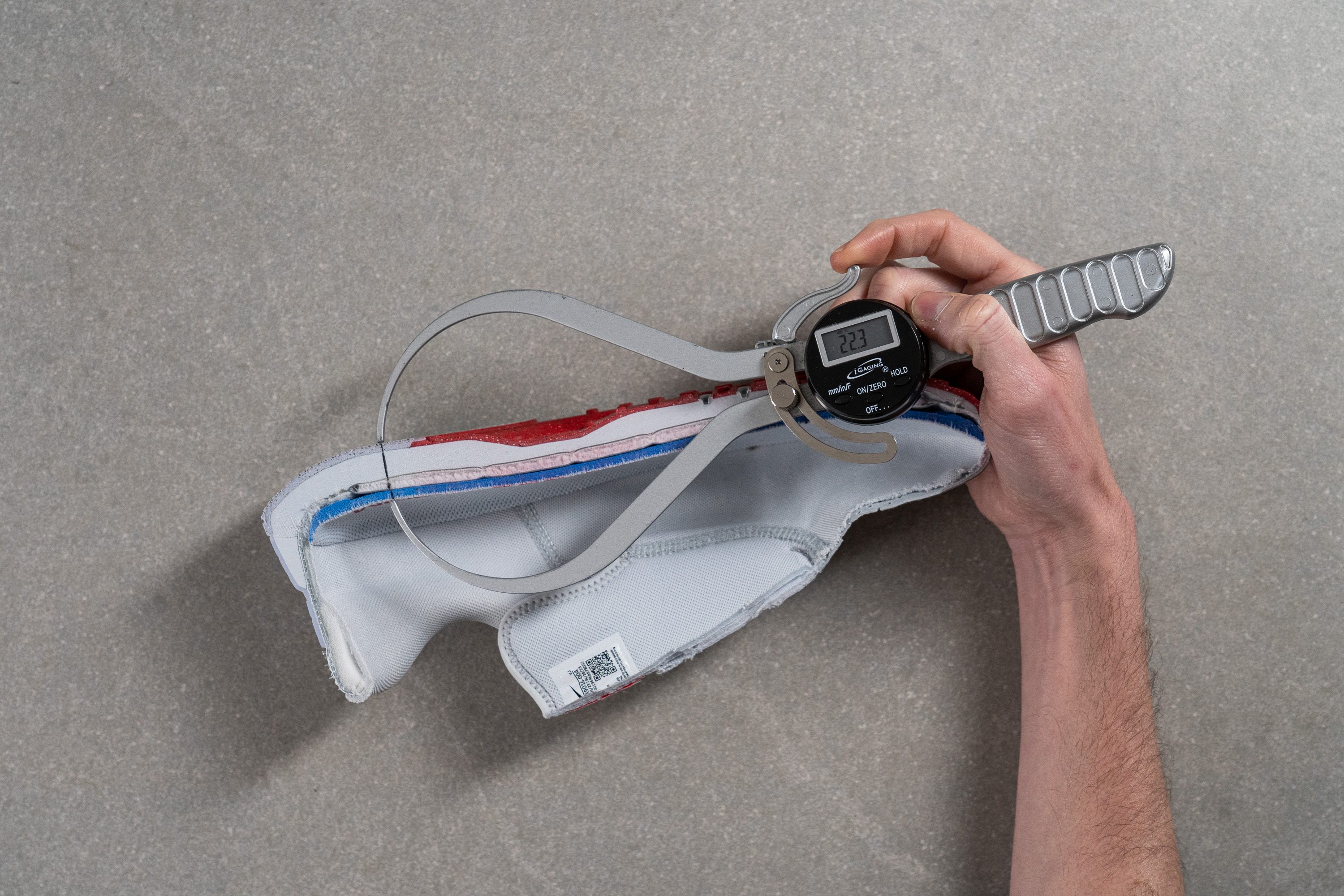
| Air Zoom TR 1 | 22.3 mm |
| Average | 24.3 mm |
Forefoot stack
As with the heel, the forefoot stack was also average. Our caliper pegged the forefoot's thickness at 18.4 mm.
Do we have complaints about the average midsole? Not really. It worked as it should, providing us with enough ground feel to stabilize our runs. It also provided enough softness to keep pain at bay.
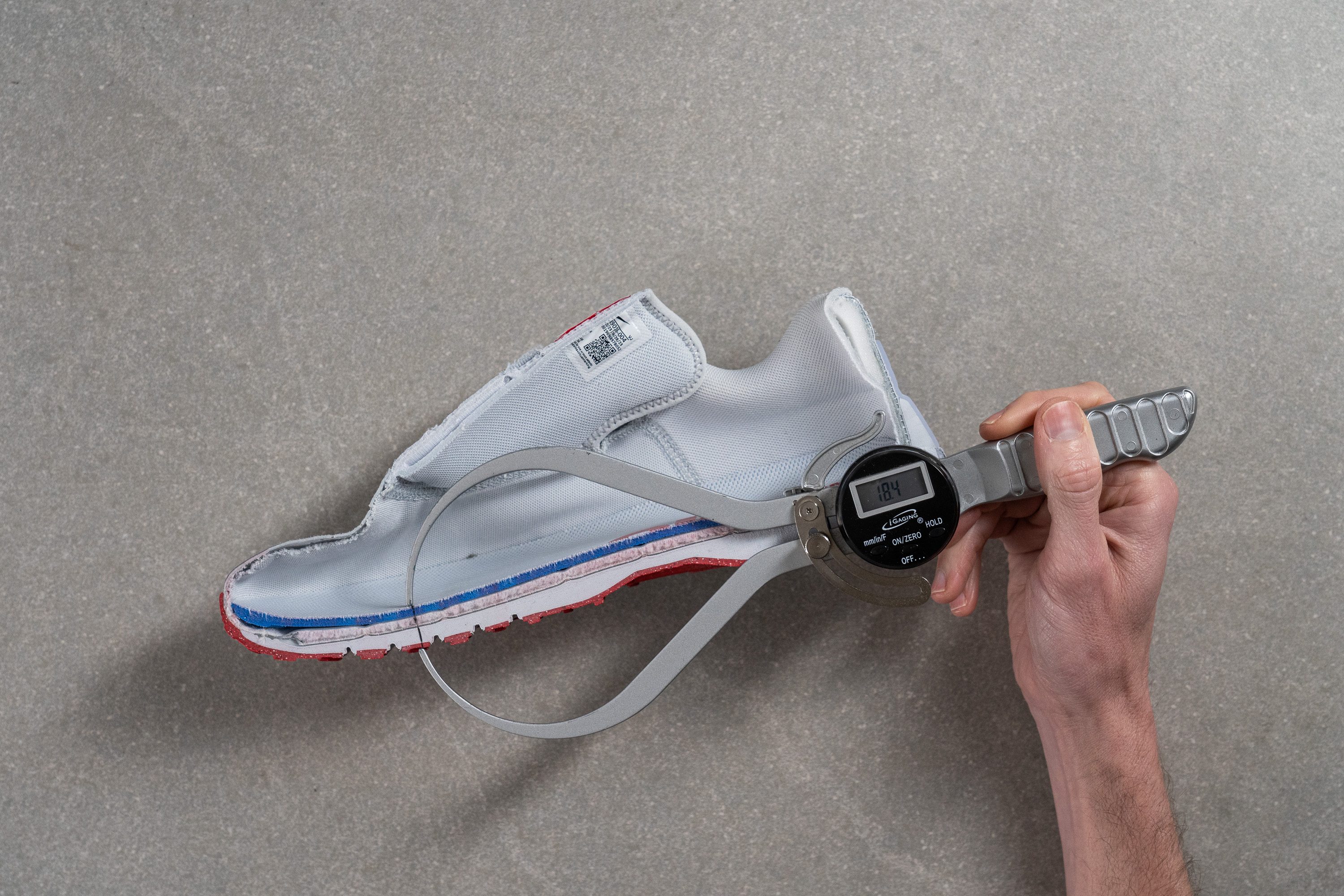
| Air Zoom TR 1 | 18.4 mm |
| Average | 18.1 mm |
Drop
This Nike training shoe was just as flat as any other trainer that we tried. As such, we did not feel clunky when we walked around while wearing it. The video below clearly shows our relatively smooth steps.
Based on our calculations, its heel-to-toe drop was 3.9 mm.
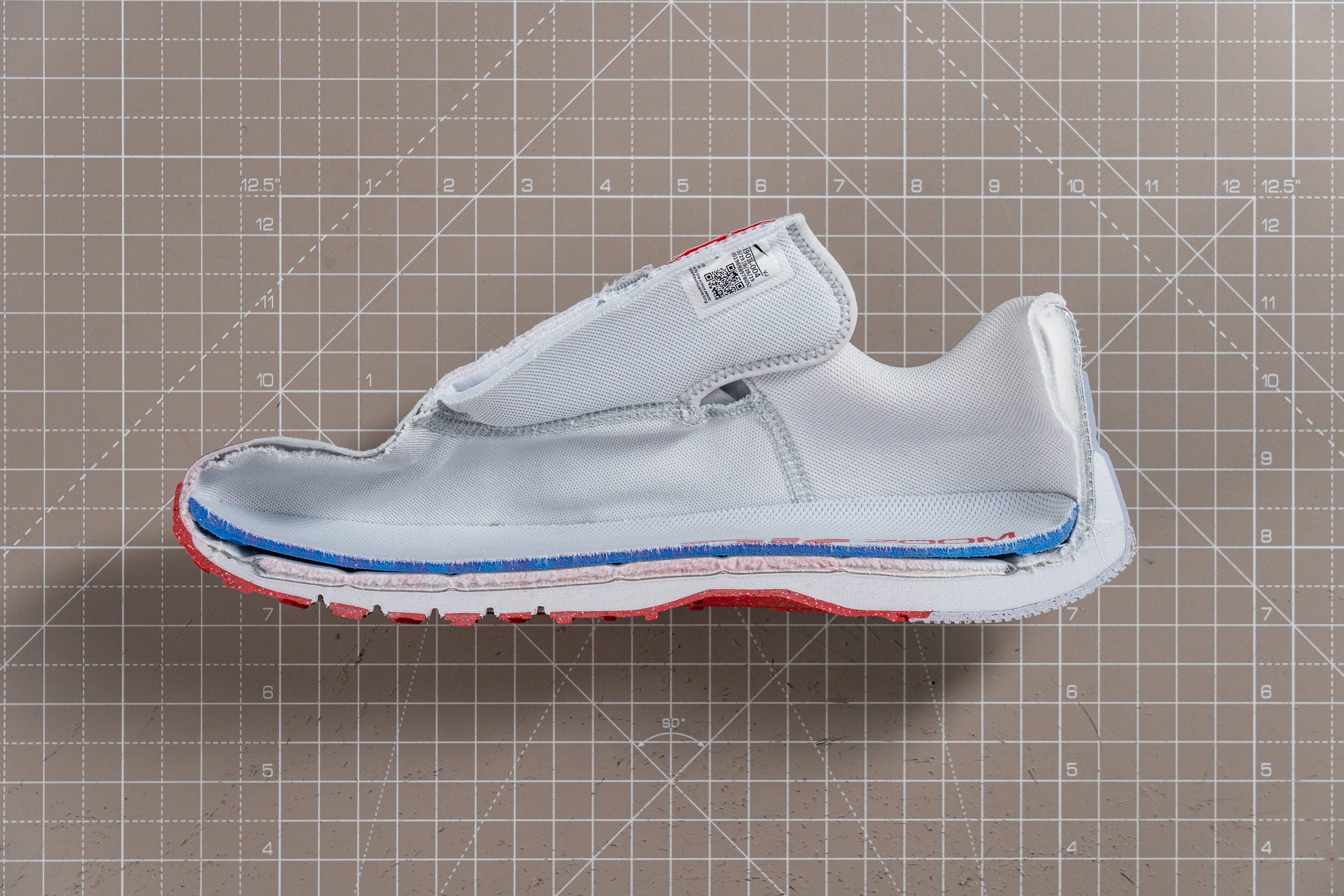
| Air Zoom TR 1 | 3.9 mm |
| Average | 6.3 mm |
Midsole softness
The midsole may be of average thickness, but it surely felt significantly softer than usual. The video below shows how easy it was for the midsole to compress when pushed against a hard surface.
We welcomed its softness as good news because it proved useful in keeping us pain-free even if our workouts dragged on for long hours. The pain-free experience was still there even if our workout program included a lot of jumping rope, jumping jacks, and other similar exercises.
What's even better is that the shoe was equipped with an Air Zoom unit that consistently delivered a lot of energy. It pretty much fueled our explosive workouts.
Our HA durometer gave the midsole a softness rating of 20.5, which is much lower (hence softer) than the average on record.
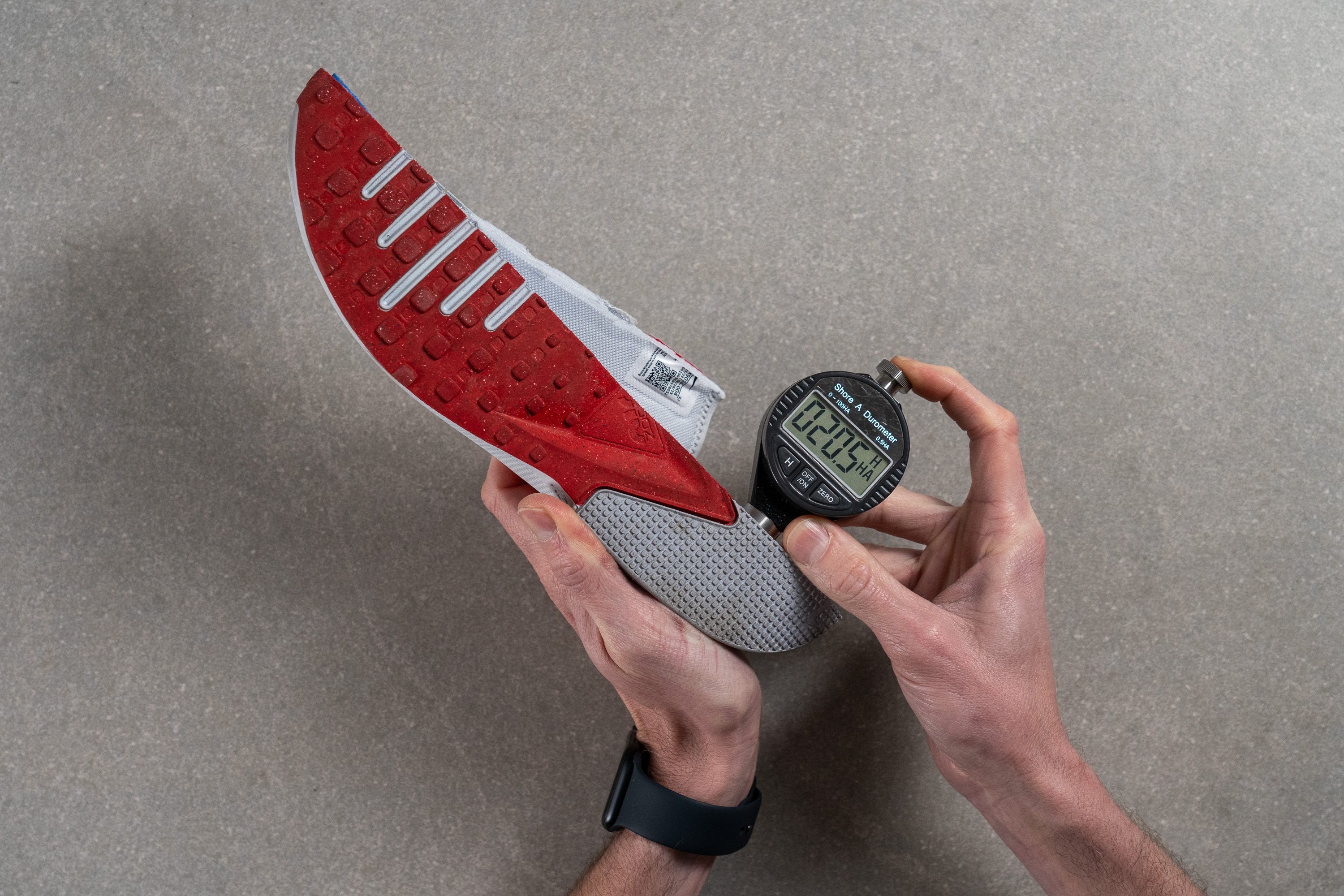
| Air Zoom TR 1 | 20.5 HA |
| Average | 27.8 HA |
Size and fit
Size
Nike Air Zoom TR 1 fits true to size (57 votes).
Internal length
| Air Zoom TR 1 | 276.3 mm |
| Average | 268.9 mm |
Width / Fit
The Nike Air Zoom TR 1 fits our medium-width feet exactly as expected, with no pinch points or dead space. But let's see if the gel mold of the shoe's interiors confirms our experience.
Once the gel had cooled, we measured the widest part of the mold with a caliper. And indeed, it turned out to be only a millimeter away from the average.
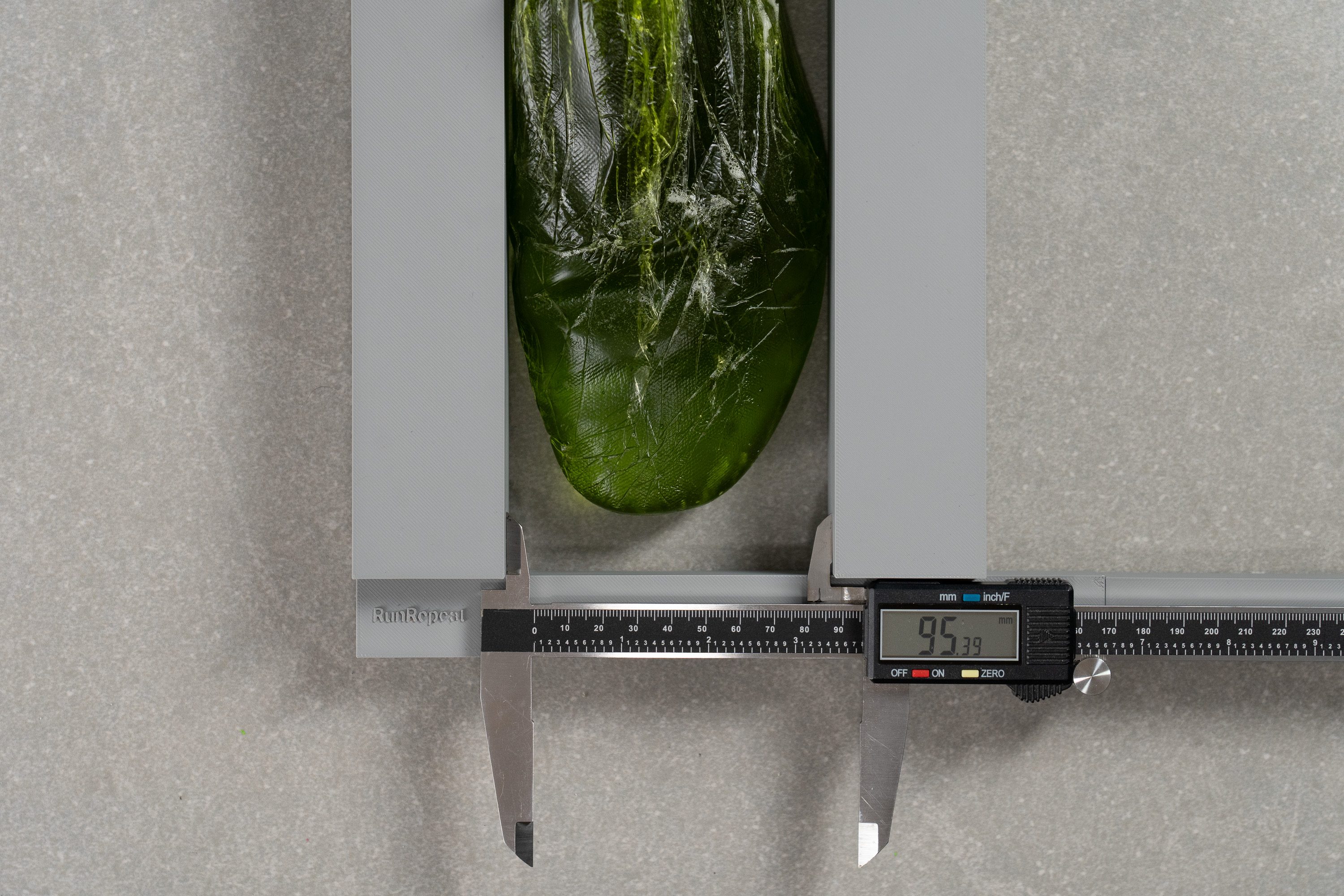
| Air Zoom TR 1 | 95.4 mm |
| Average | 96.6 mm |
Toebox width
The shoe's mild tapering didn't pose any concerns either.
With a caliper reading of 71.5 mm in the big toe area, it is only slightly narrower than average (but still in the medium range).
Because of that, we think that gym goers with medium and narrow feet will find the Air Zoom TR 1 a well-fitting shoe. However, the same toebox dimensions make this Nike trainer less than ideal for wide footers, especially since it's only available in medium width.
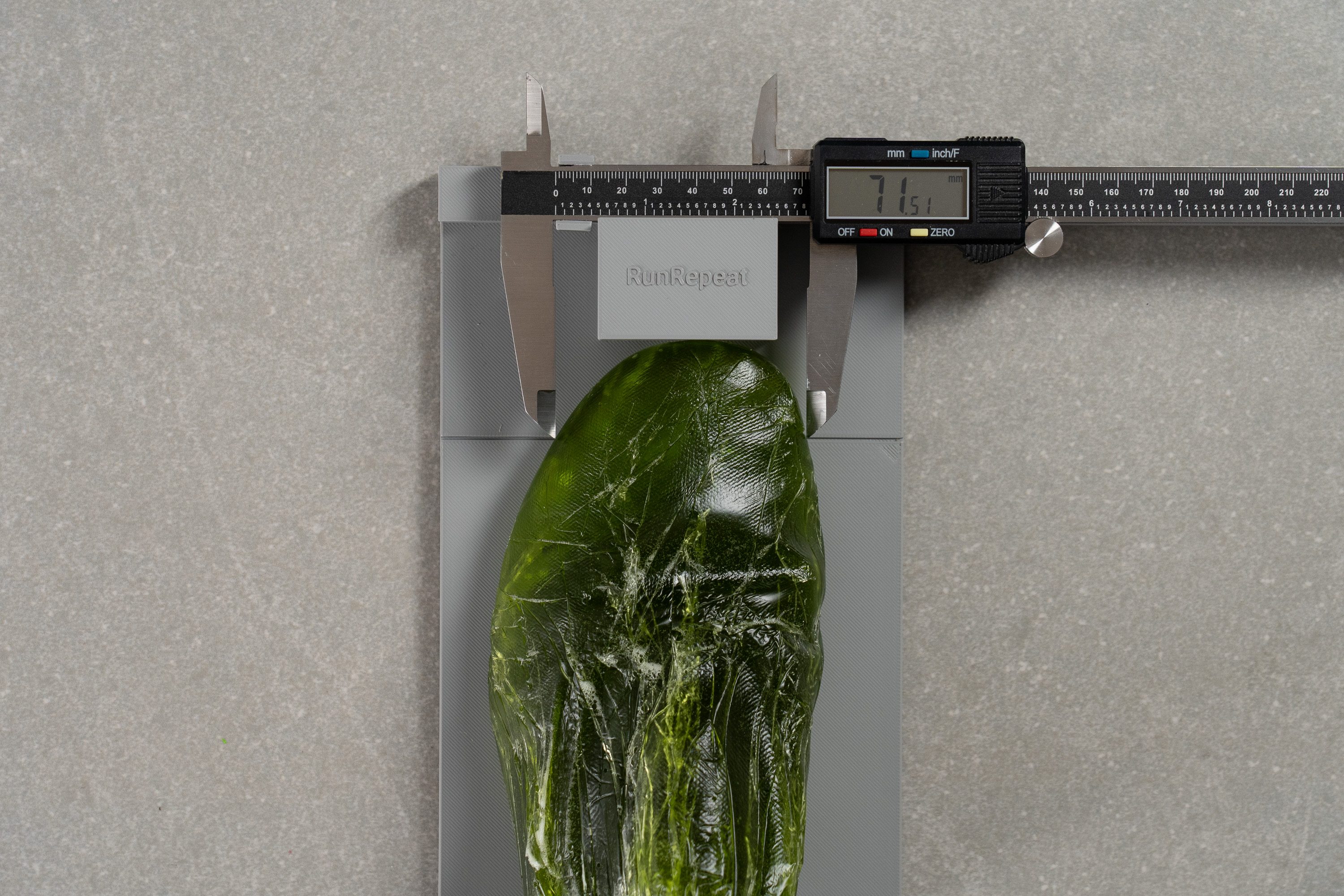
| Air Zoom TR 1 | 71.5 mm |
| Average | 73.5 mm |
Toebox height
We also found the shoe's vertical space sufficient at 28.1 mm. We experienced no pressure on top of our toes.
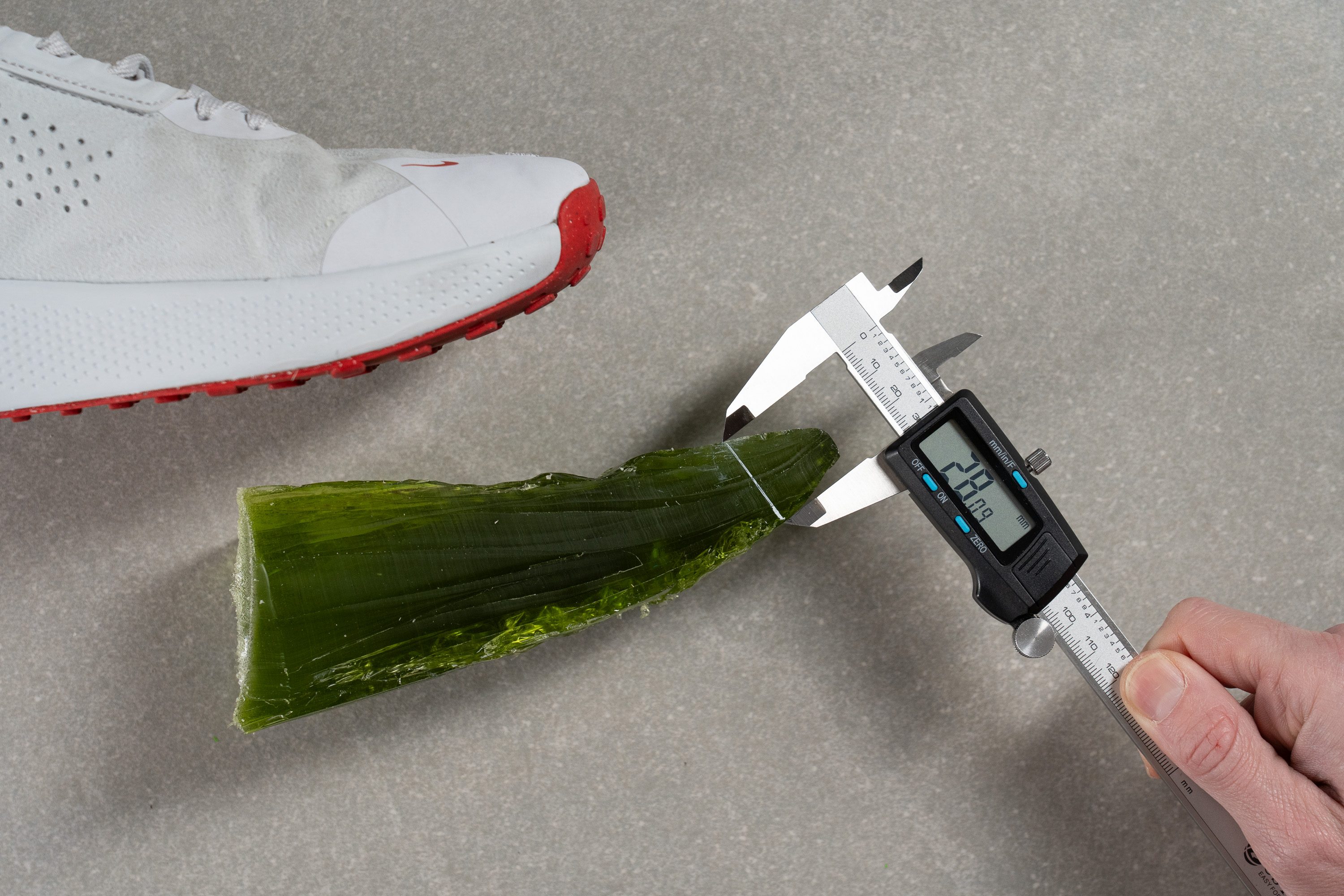
| Air Zoom TR 1 | 28.1 mm |
| Average | 27.1 mm |
Flexibility / Stiffness
This Nike training shoe was flexible enough to bend whenever we needed it to. Performing exercises such as burpees, mountain climbers, and planks was never a problem.
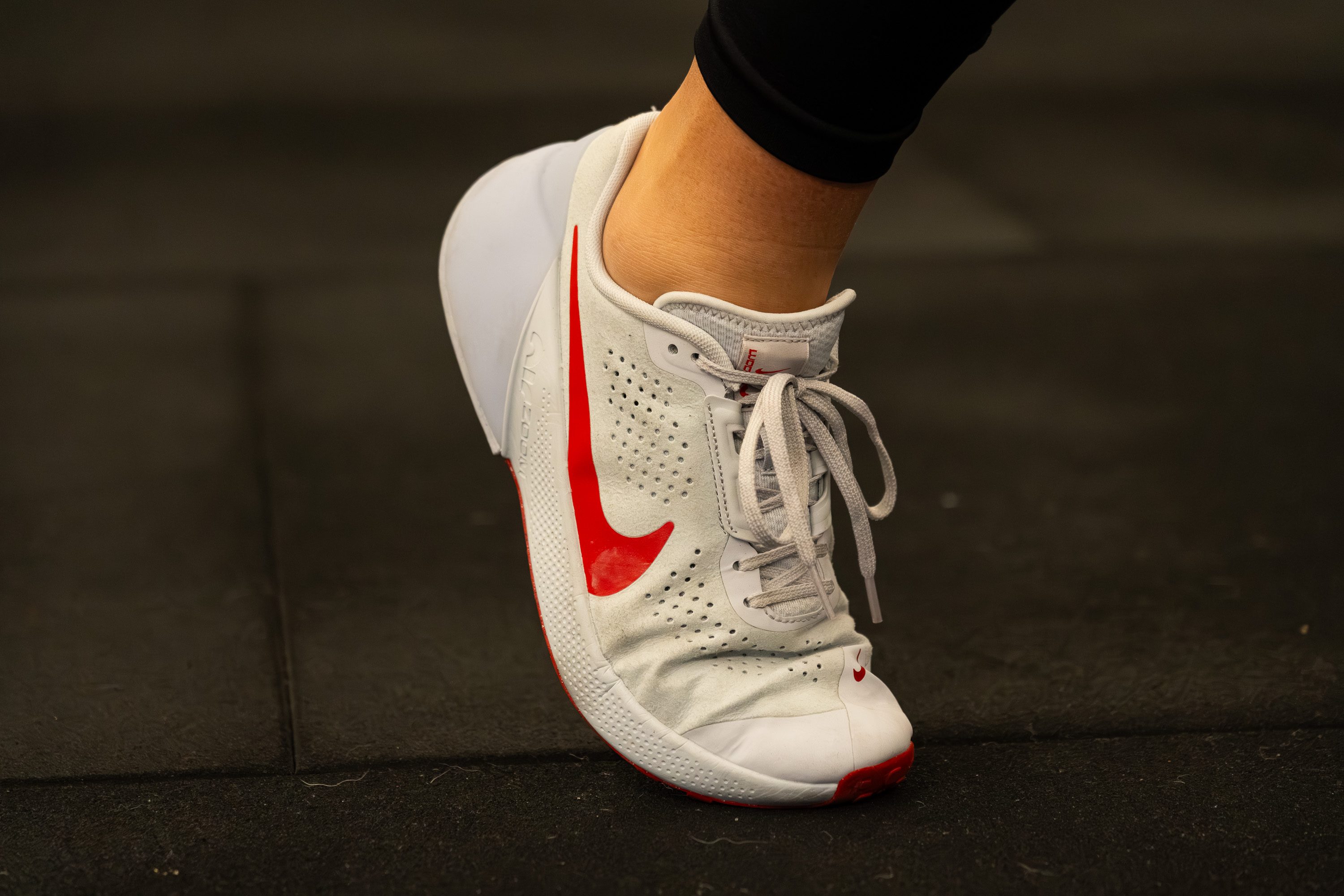
In the lab, we learned that this trainer needed 17.7N to bend at 90 degrees. This number is just around the average.
This test follows an older methodology, which is why you don't see recently tested shoes in the chart. Results from different methodologies can not be compared.
| Air Zoom TR 1 | 17.7N |
| Average | 17.7N |
Weight
We felt nothing too special with the weight of this Nike trainer. Our scale in the lab pegged this shoe's weight to be 11.5 ounces or 325 grams.
We have no complaints, though, since this shoe still allowed us to jump or run without much issue. We could say that the Air Zoom TR 1 worked as expected in this regard.
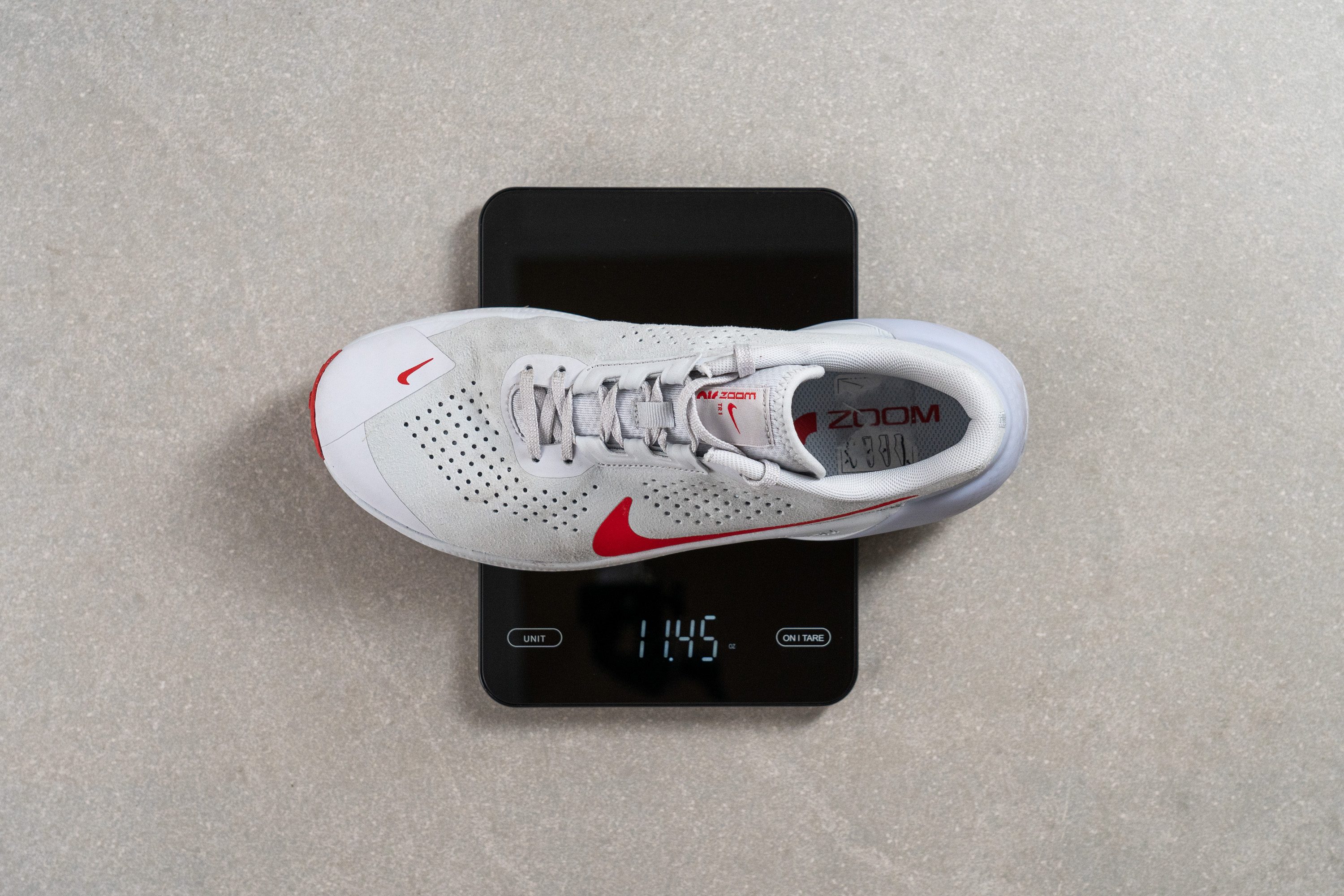
| Air Zoom TR 1 | 11.5 oz (325g) |
| Average | 10.7 oz (304g) |
Breathability
We felt intense heat while we were working out in the Nike Air Zoom TR 1. Some of us felt a deluge brewing inside the shoes! We could only use this shoe for short workouts at best because of the klack of breathability.
We pumped smoke into the shoe and it was pretty frustrating to see that very little smoke (if at all) was able to pass through the upper material. No wonder it was so hot! The experience was VERY different from the one we had with the Adidas Dropset 2, which got a perfect 5 for ventilation.
The light test, however, showed a lot of transparent areas. That observation was misleading because we never felt air blowing because of how closed off this trainer was. We felt it would be a crime to give this trainer a score better than 1 over 5.
When viewed under the microscope, the upper showed a frustrating image.
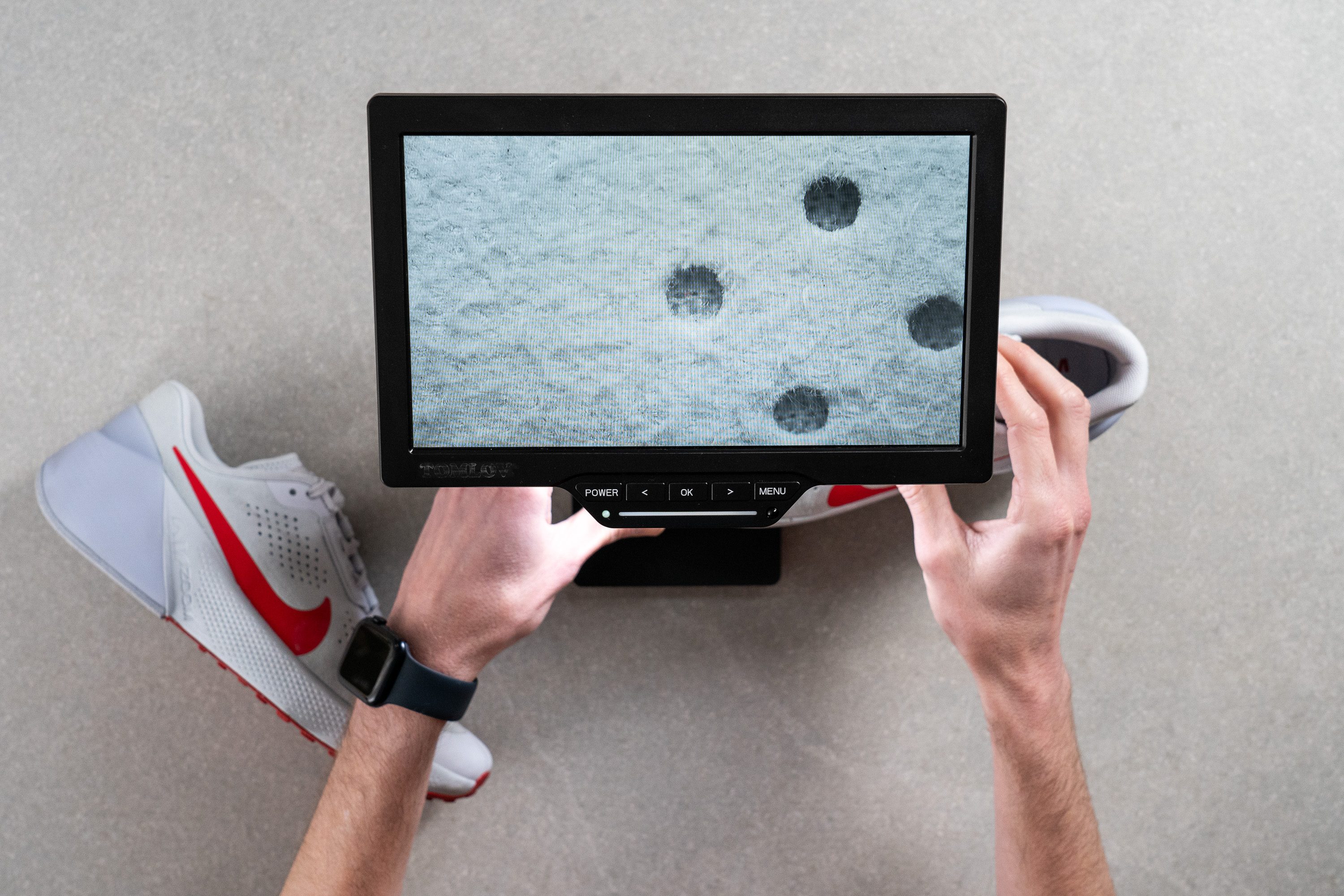
True, there were ventilation holes. However, there was another layer of mesh material right beneath those holes. Having this layer defeated the purpose of having the holes in the first place.

| Air Zoom TR 1 | 1 |
| Average | 3.6 |
Stability
Lateral stability test
We do not recall having any problems with the Nike Air Zoom TR 1 in terms of its lateral stability.
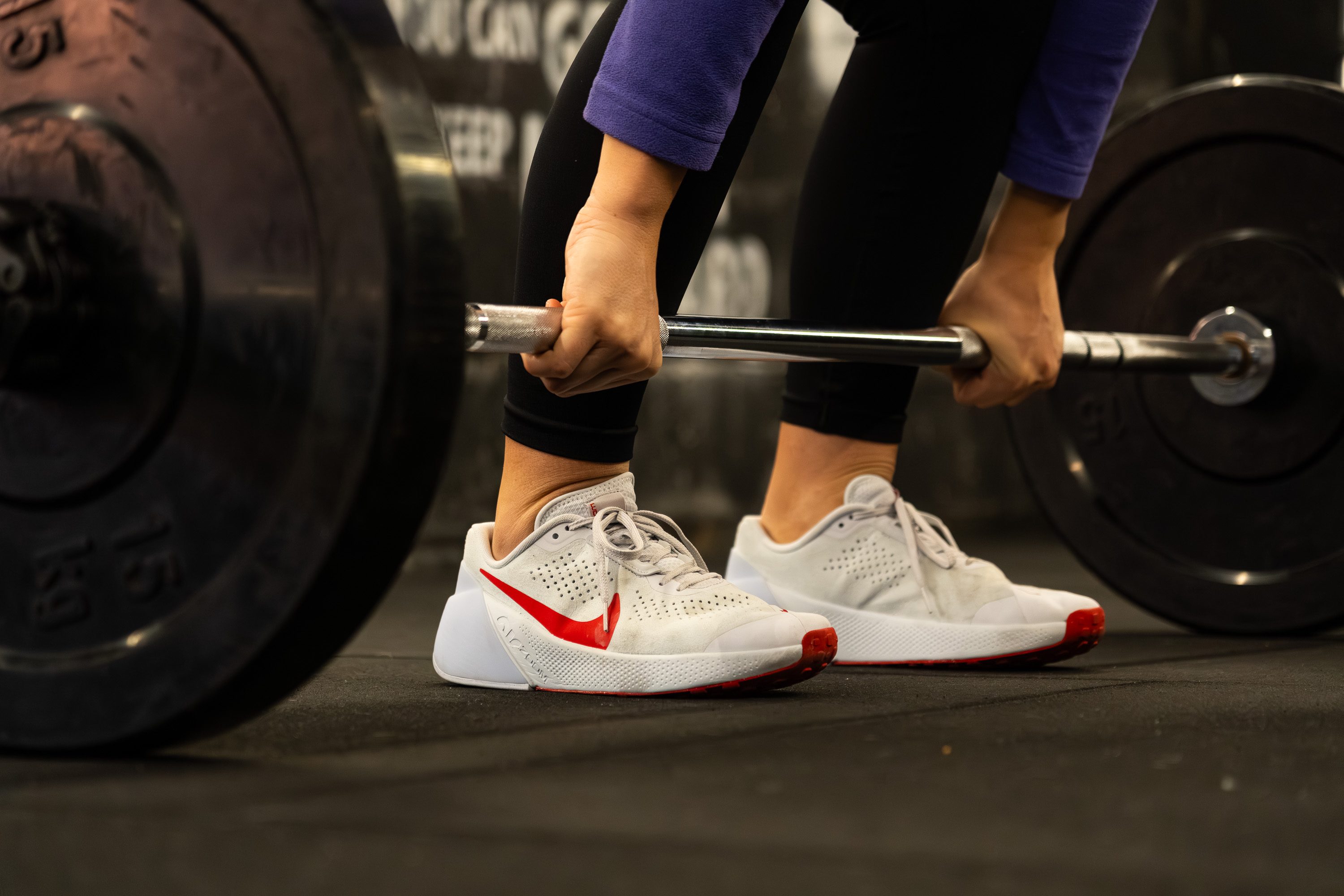
While it was not the best (the Nike Metcon 9, for example, is better), it still allowed us to feel confident when we performed some lifting exercises.
Torsional rigidity
Lifting exercises were also made easier by the moderate twist resistance that the Nike Air Zoom TR 1 displayed.
Back in the lab, we manually twisted and bent this Nike trainer. We've handled more rigid kicks, but this one was still a lot better than the Legend Essential 3 from Nike, which got the lowest 1 over 5 for torsional rigidity. It deserved a 3 out of 5.
| Air Zoom TR 1 | 3 |
| Average | 2.9 |
Heel counter stiffness
We felt more confident hoisting plates, kettlebells, and even barbells overhead because of how secure our heels felt while wearing the Nike Air Zoom TR 1.
We manually assessed the stiffness of the heel in the lab by giving it a good squeeze. It got a well-deserved 4 out of 5 from us.
| Air Zoom TR 1 | 4 |
| Average | 2.7 |
Midsole width - forefoot
The platform of the Air Zoom TR 1 was of average size. At the forefoot, it was 111.2 mm wide.
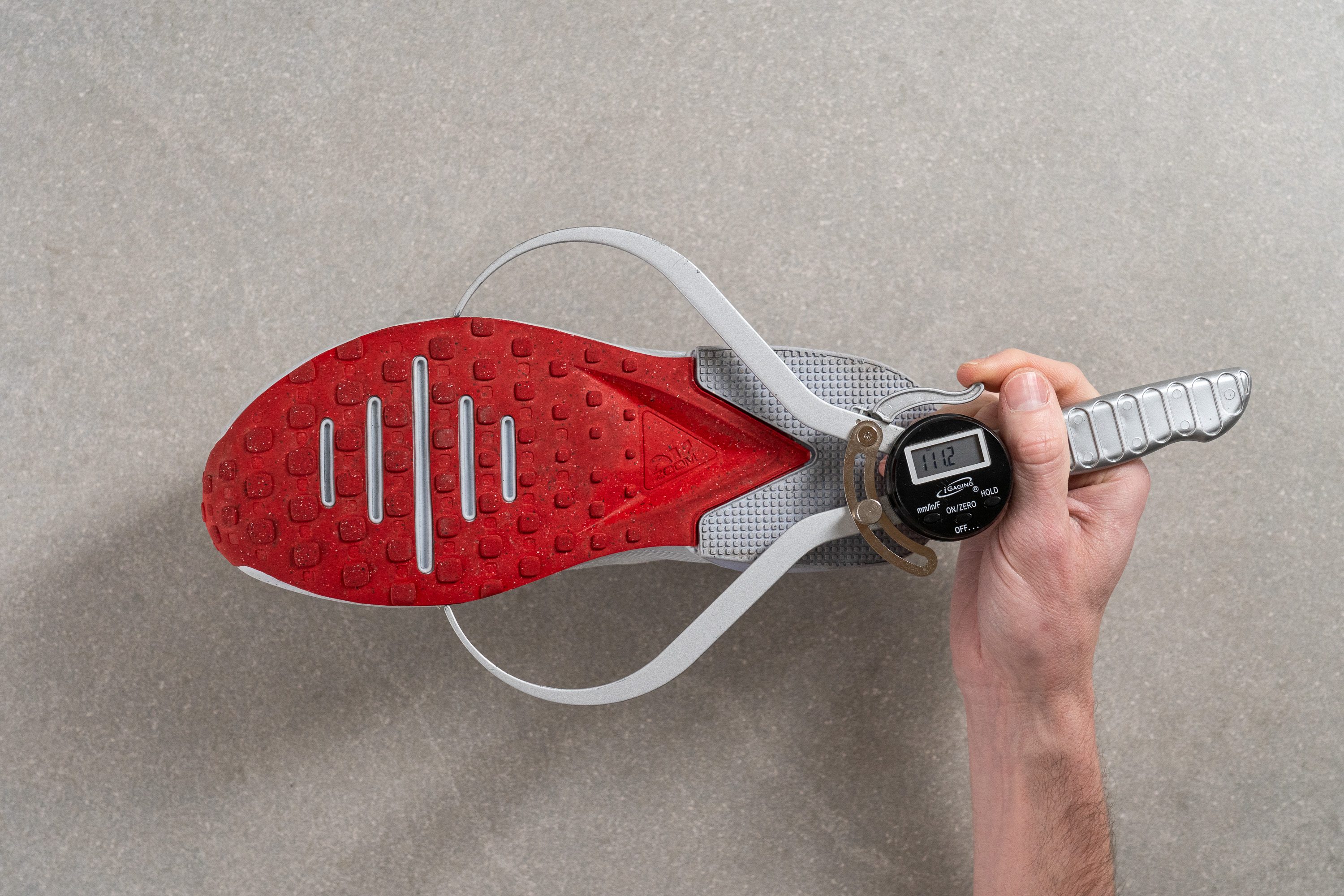
| Air Zoom TR 1 | 111.2 mm |
| Average | 110.9 mm |
Midsole width - heel
The heel area of the platform was also of average width at 87.1 mm.
We could not find any serious flaws with the platform. In all fairness, it was able to keep our feet well-contained whatever exercise we were performing.
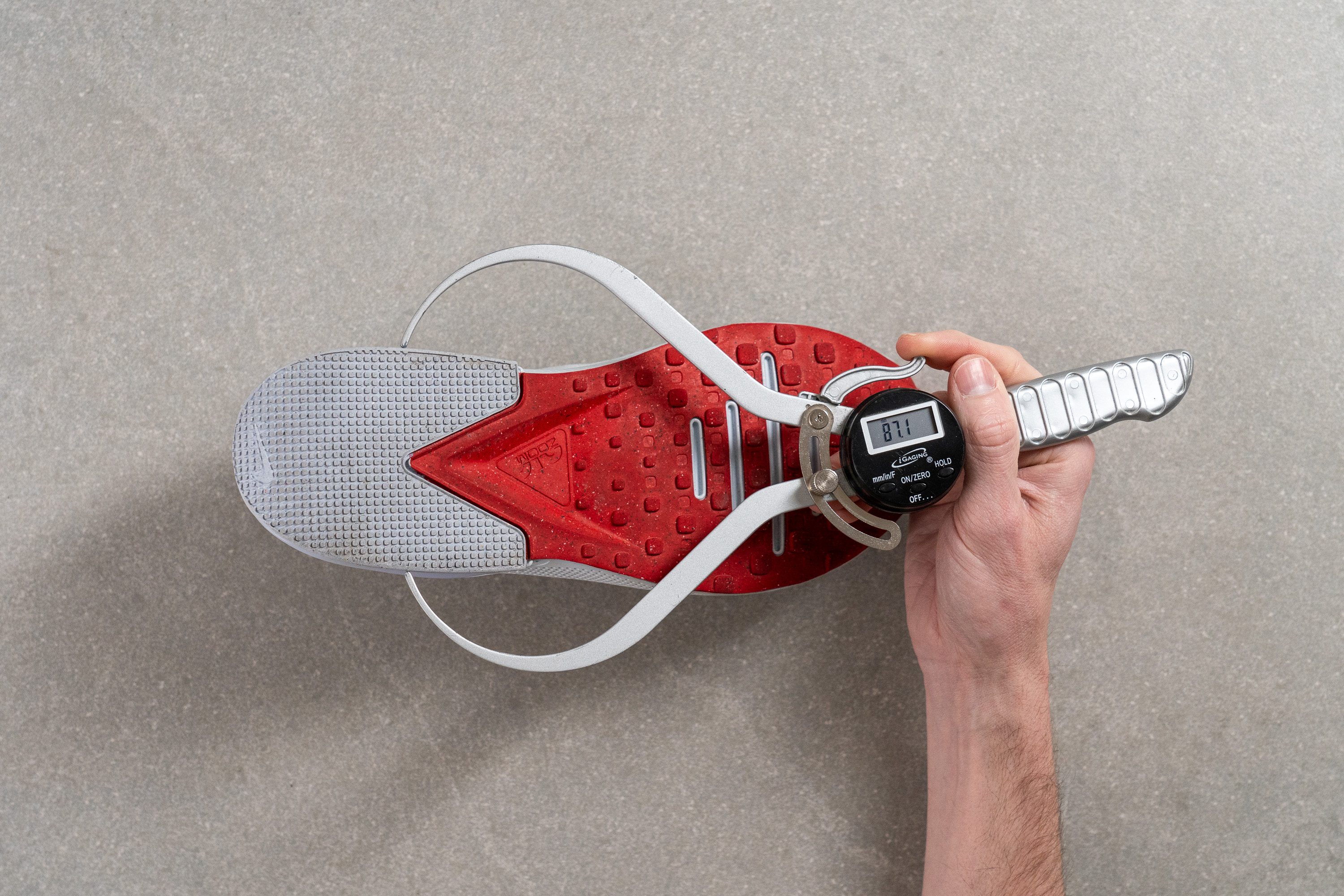
| Air Zoom TR 1 | 87.1 mm |
| Average | 86.9 mm |
Durability
Toebox durability
Just by looking at it, we already had the idea that the upper of the Nike Air Zoom TR 1 would have a lot of durability. Our lab results confirmed our initial assessment.
We pressed the Dremel against the shoe's upper, and the toebox showed impressive resistance. Only a scratch was seen after the high-pressure assault, prompting us to give the Nike Air Zoom TR 1 a perfect 5 for toebox durability.
As seen in the picture below, the state of the Air Zoom TR 1 was very different from the Adidas Dropset Trainer, which got a 1 over 5, in the aftermath of the Dremel test.
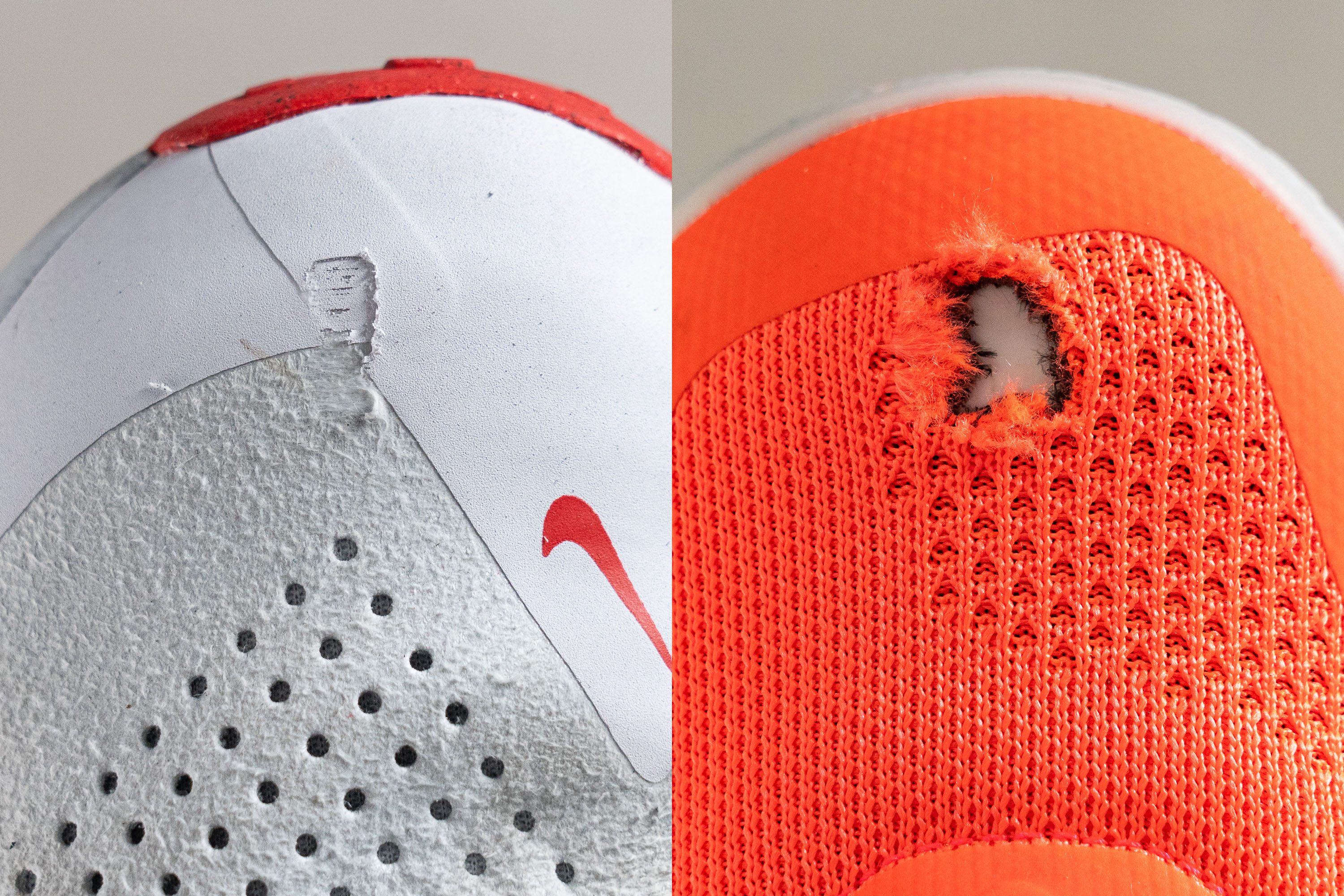
| Air Zoom TR 1 | 5 |
| Average | 2.7 |
Heel padding durability
During our lab test, the heel padding of the Air Zoom TR 1 showed moderate resistance to abrasion. Because of this, we were able to give this shoe a solid 3 out of 5 for the sturdiness of its heel padding.
We have to admit, the damage that our Dremel assault left on the heel was not to be ignored. We still suggest that users be careful not to rub against the heel padding too much, especially when performing repetitive jumping exercises.
Yet, the Nike Air Zoom TR 1 still fared better than the Nike MC Trainer 2, which got the lowest 1 over 5 for heel padding durability.
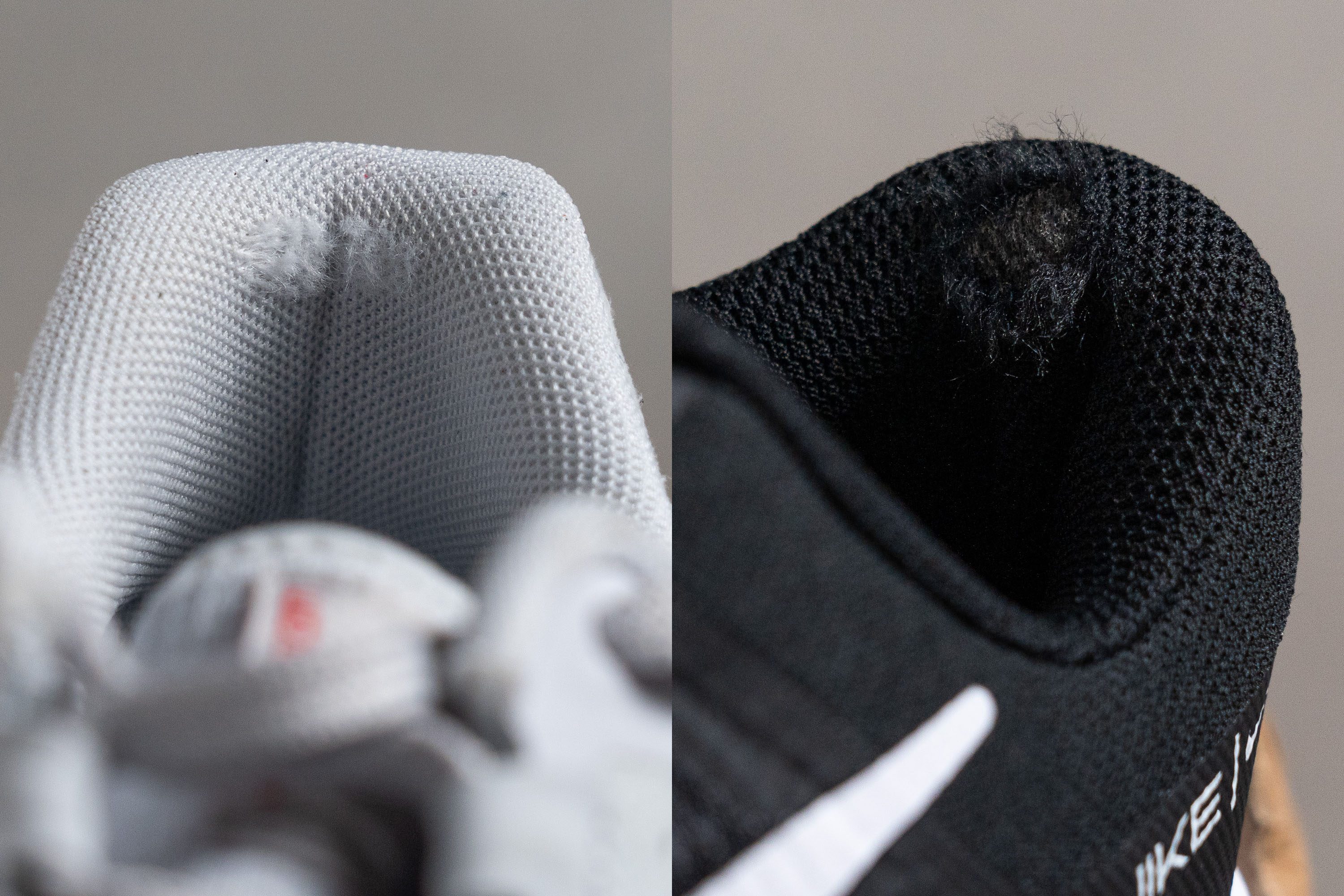
| Air Zoom TR 1 | 3 |
| Average | 2.9 |
Outsole hardness
We touched the outsole of the Nike Air Zoom TR 1 before wear-testing it, and we could say that its outsole was indeed on the softer side. We could feel our fingers sinking into it more easily than usual.
When we pressed our HC durometer against the sole, we were not anymore surprised when the device gave out a reading of 75.6, which is significantly lower than the average we have on record.
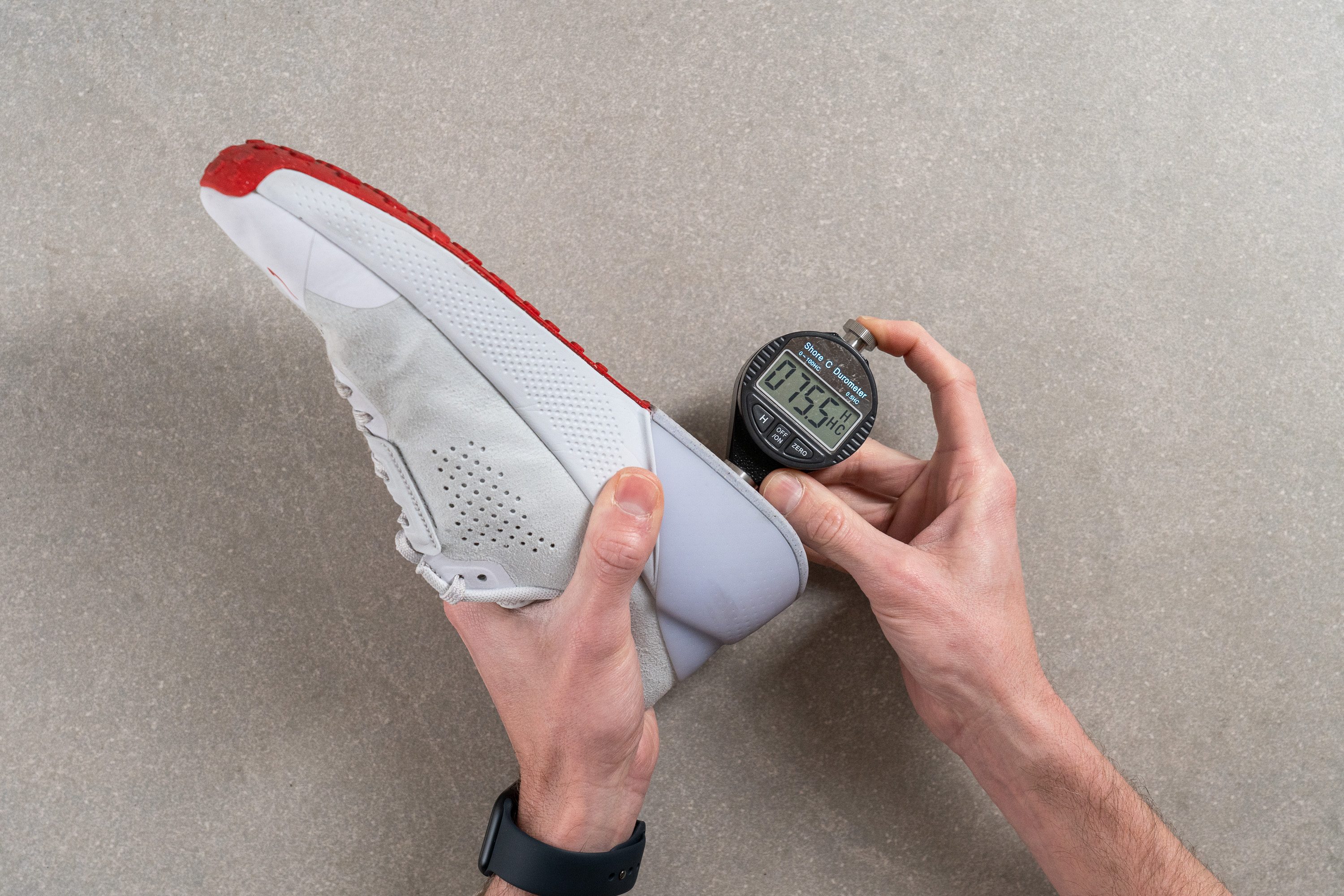
| Air Zoom TR 1 | 75.6 HC |
| Average | 83.2 HC |
Outsole durability
Surprisingly, though, the soft outsole displayed just as much durability as the typical trainers. The dent that our Dremel drilling left on it was only 1.0 mm deep, a number that is equal to our recorded average.
Given such results, we feel that this shoe is OK for occasional outdoor use. Frequent outdoor exercisers, we feel, are better off with the Nano X2 TR Adventure from Reebok.
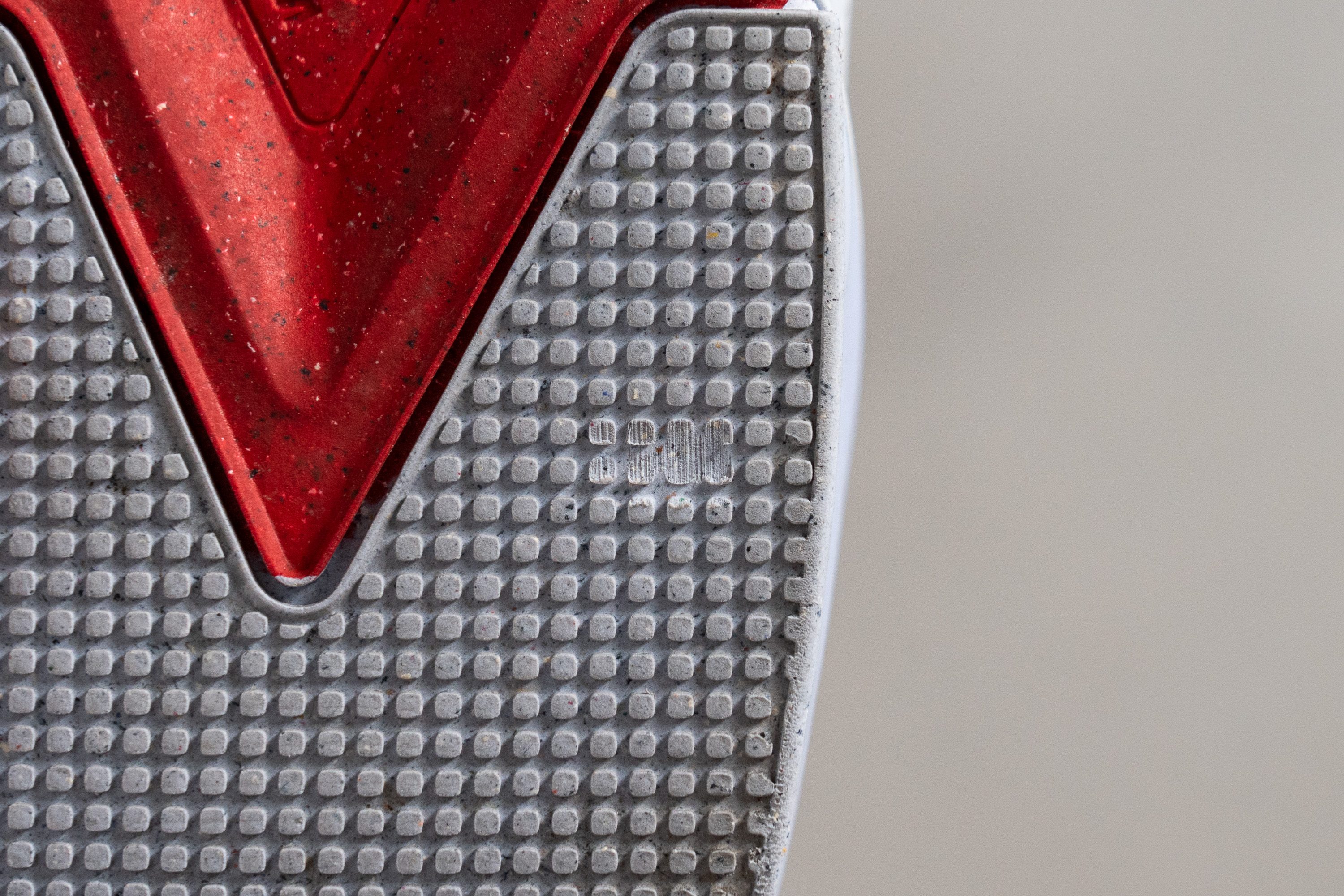
| Air Zoom TR 1 | 1.0 mm |
| Average | 1.1 mm |
Outsole thickness
Our caliper showed that the outsole of the Nike Air Zoom TR 1 was just as thick as any other at 3.5 mm.
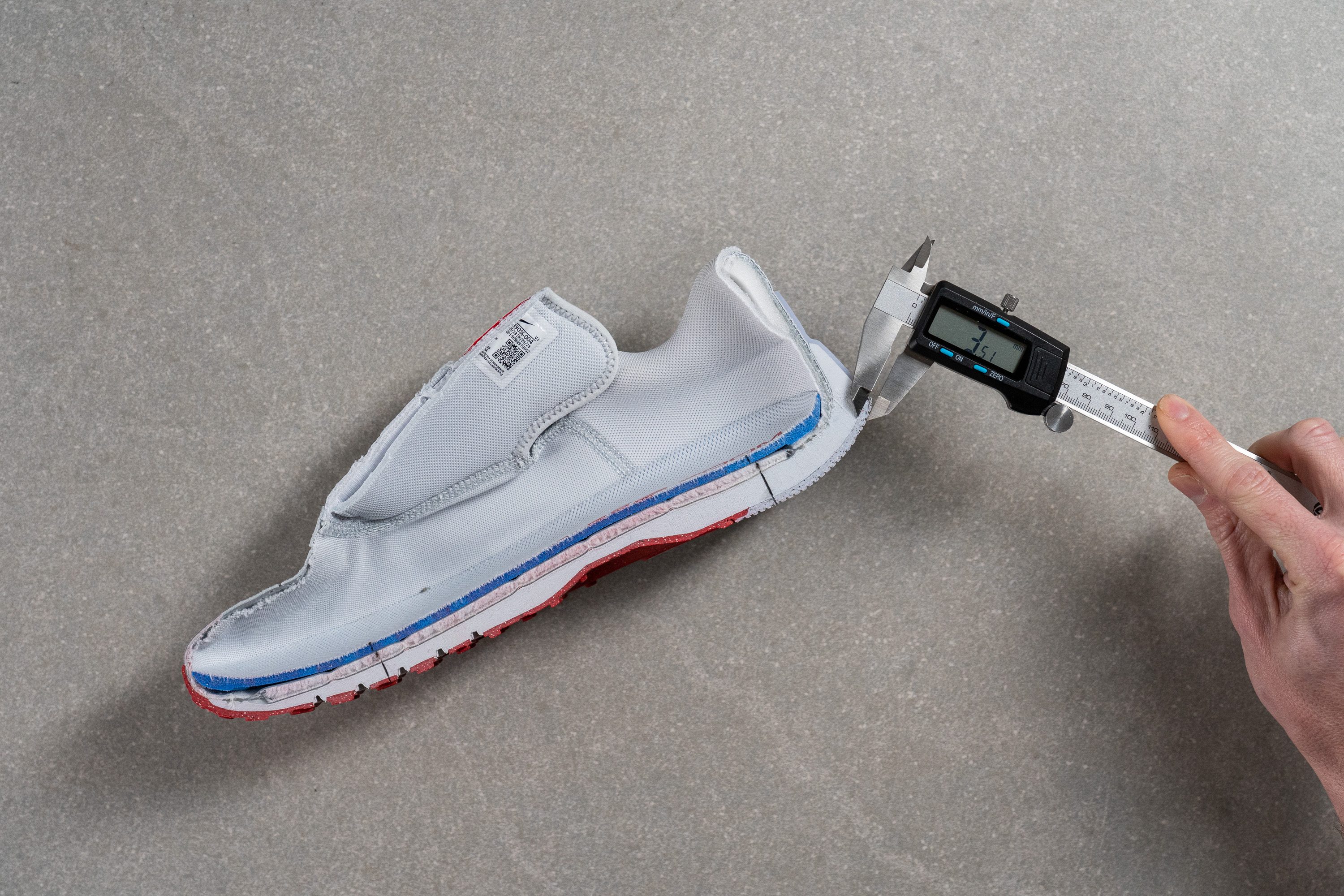
| Air Zoom TR 1 | 3.5 mm |
| Average | 3.6 mm |
Misc
Insole thickness
The shoe came with a removable insole. It was as thick as the average insole at 3.6 mm.
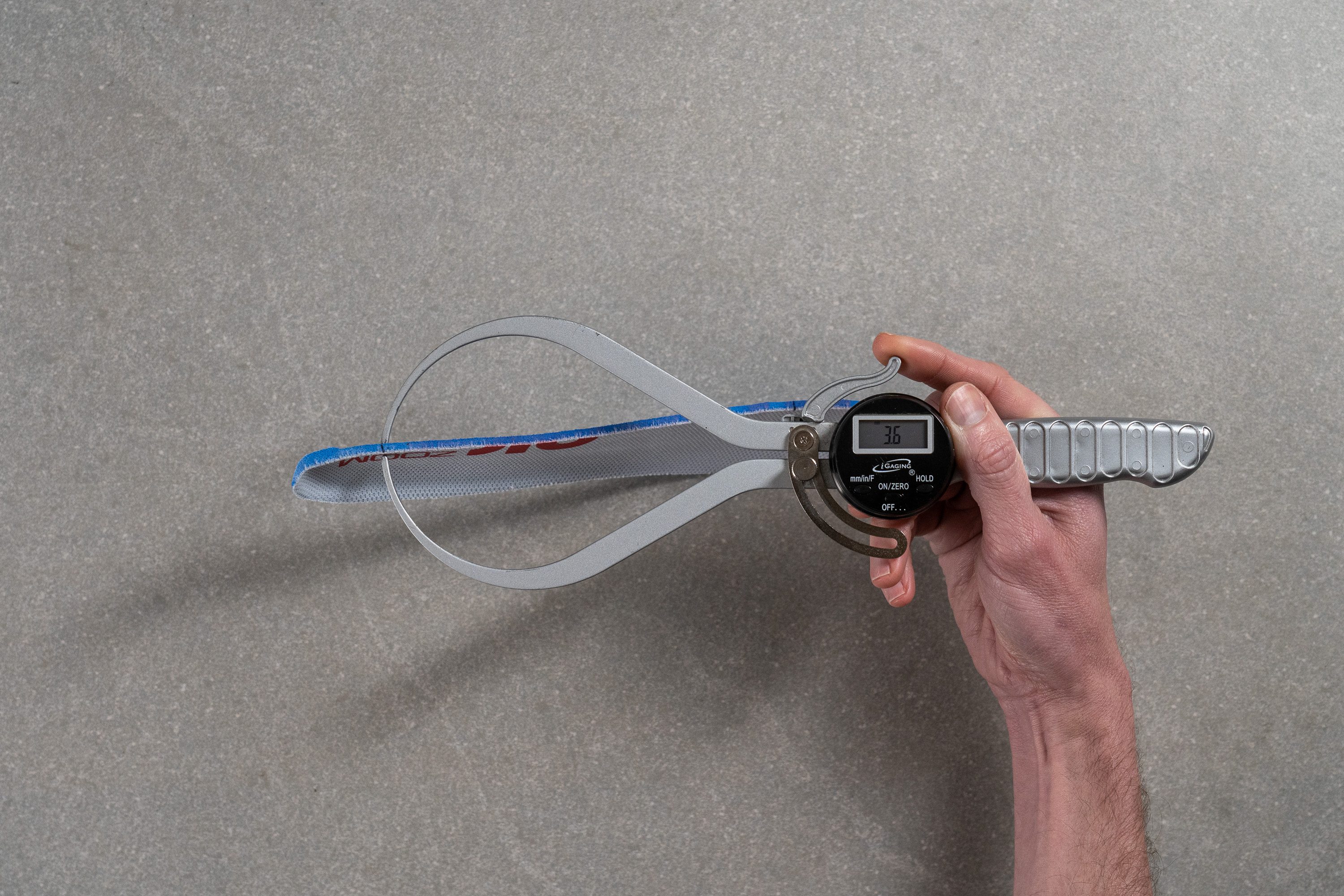
| Air Zoom TR 1 | 3.6 mm |
| Average | 4.0 mm |
Removable insole
This shoe came with a removable insole.
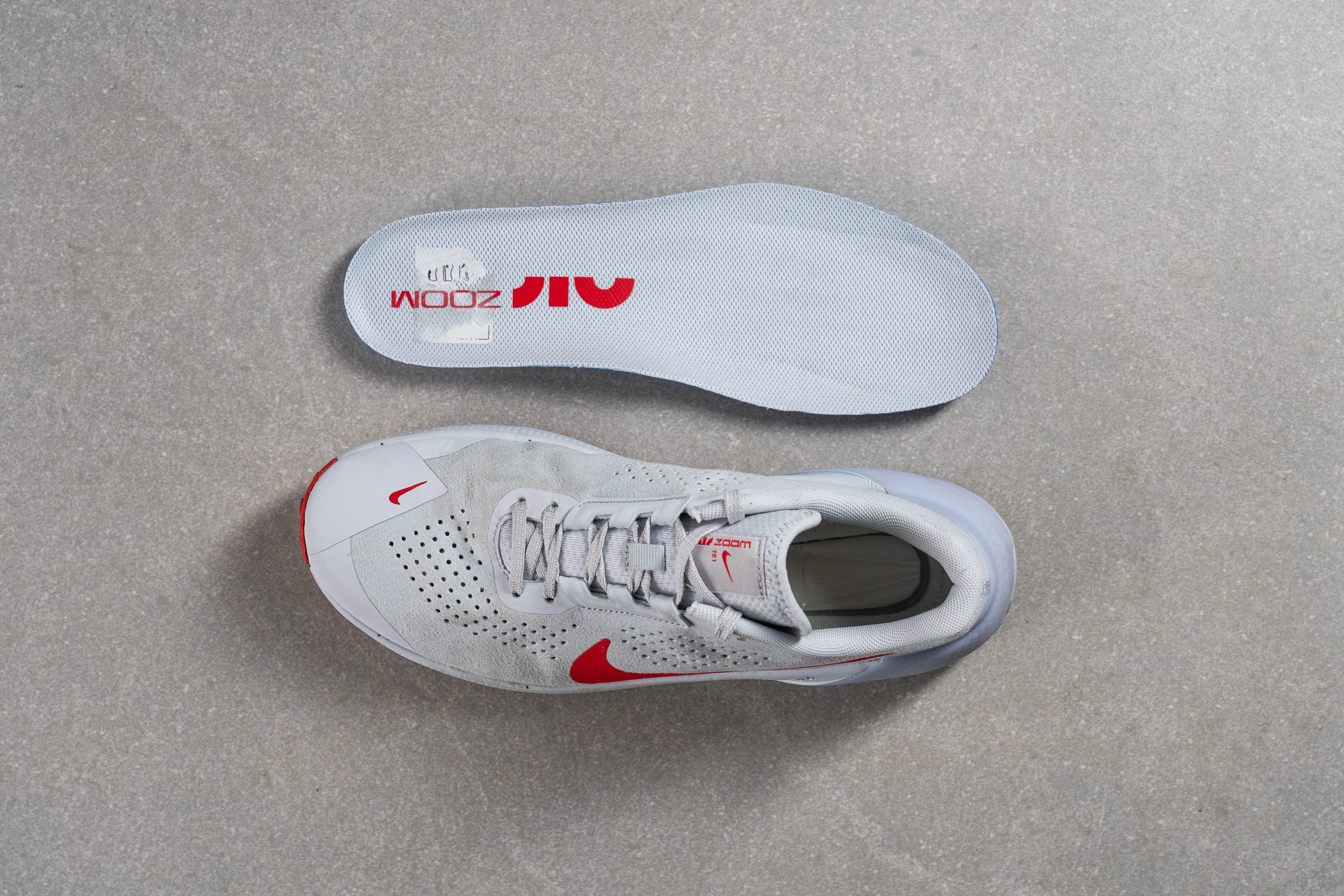
| Air Zoom TR 1 | Yes |
Reflective elements
This training shoe from Nike did not have any reflective elements that would have increased its visibility in the dark.
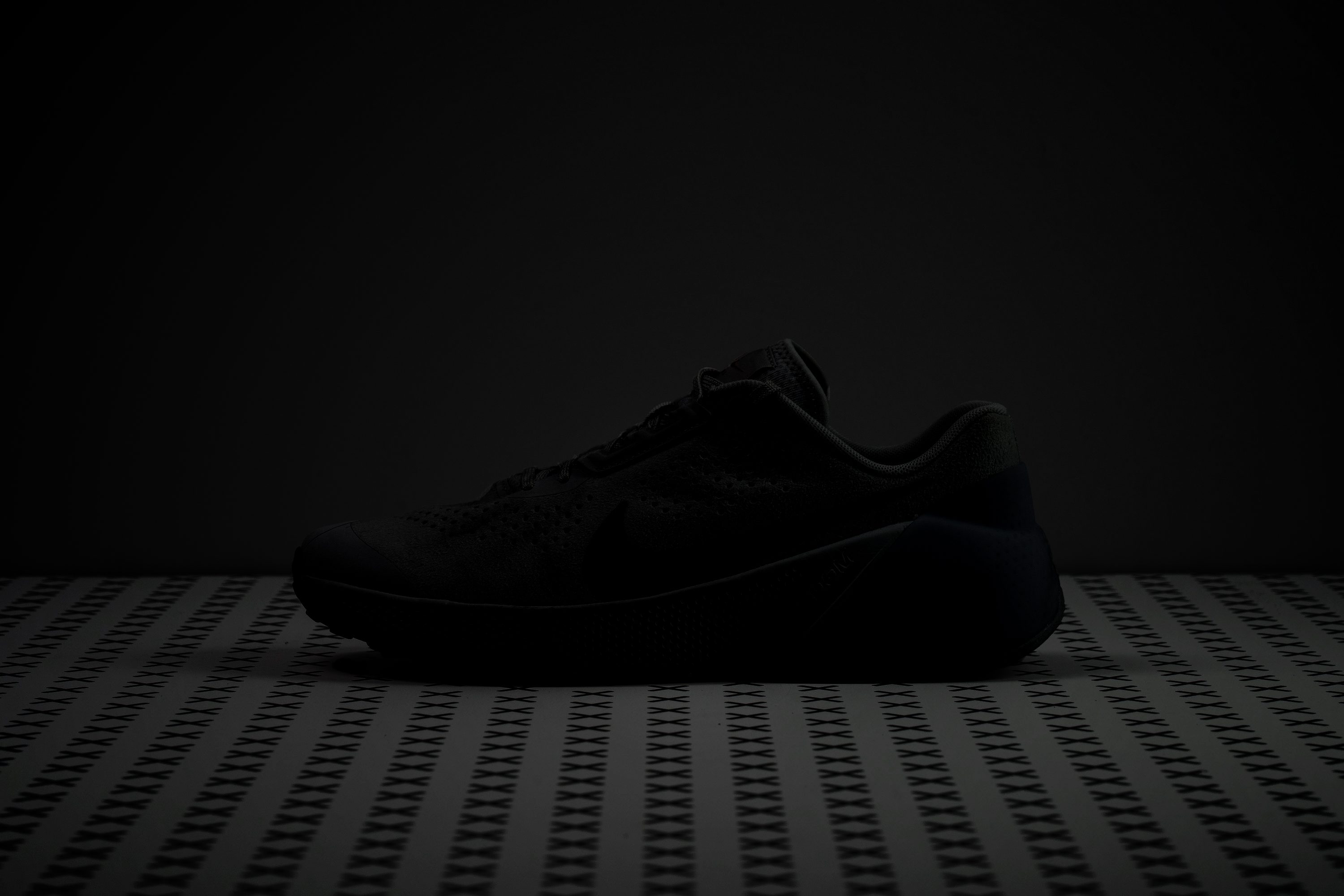
| Air Zoom TR 1 | No |
Tongue padding
The tongue had a padding that was 7.1 mm thick. It kept the top of the foot comfortable. This much padding also helped in improving the fit and foot containment.
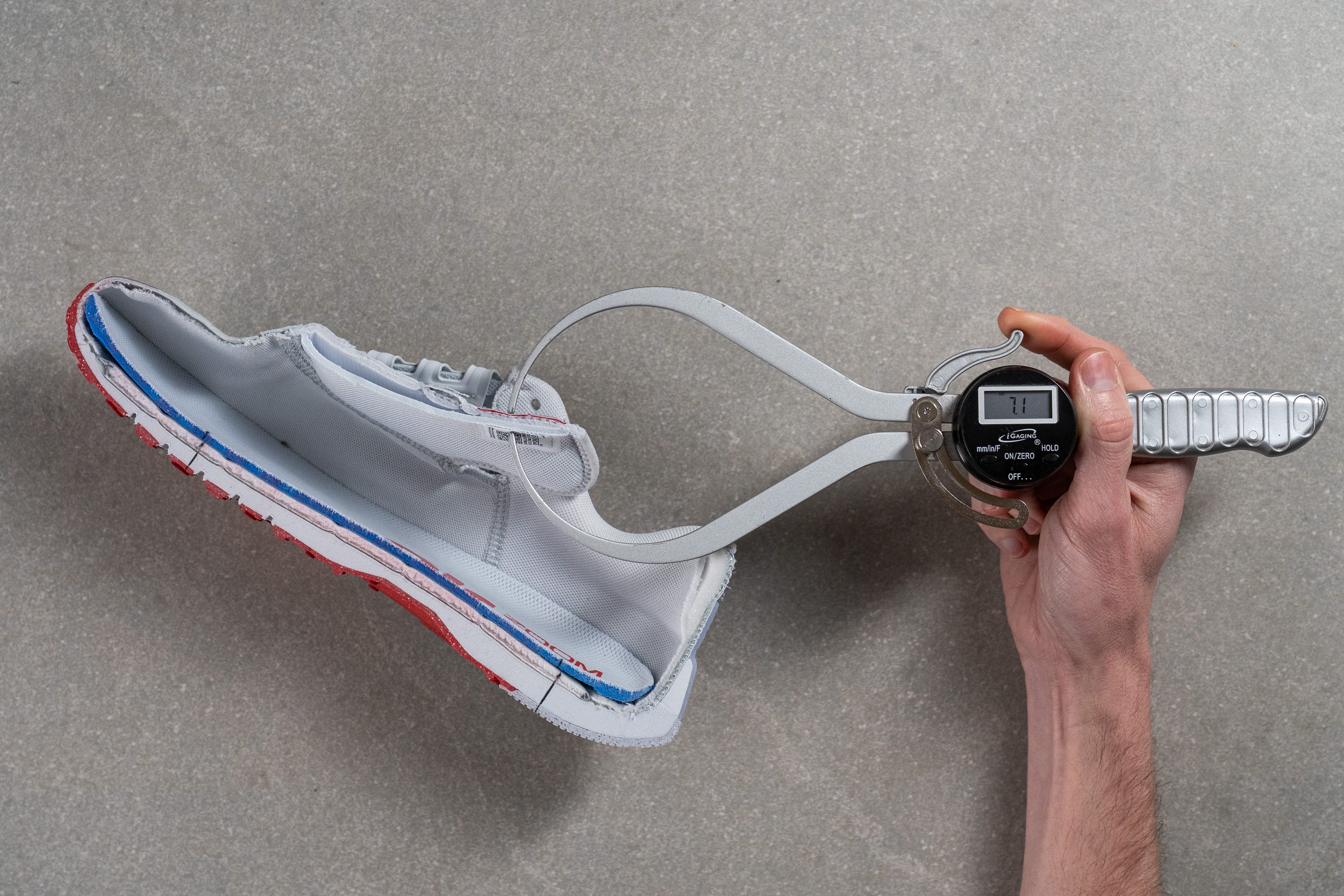
| Air Zoom TR 1 | 7.1 mm |
| Average | 5.7 mm |
Tongue: gusset type
The tongue was fully gusseted on both sides. This configuration effectively improved the fit of the shoe.
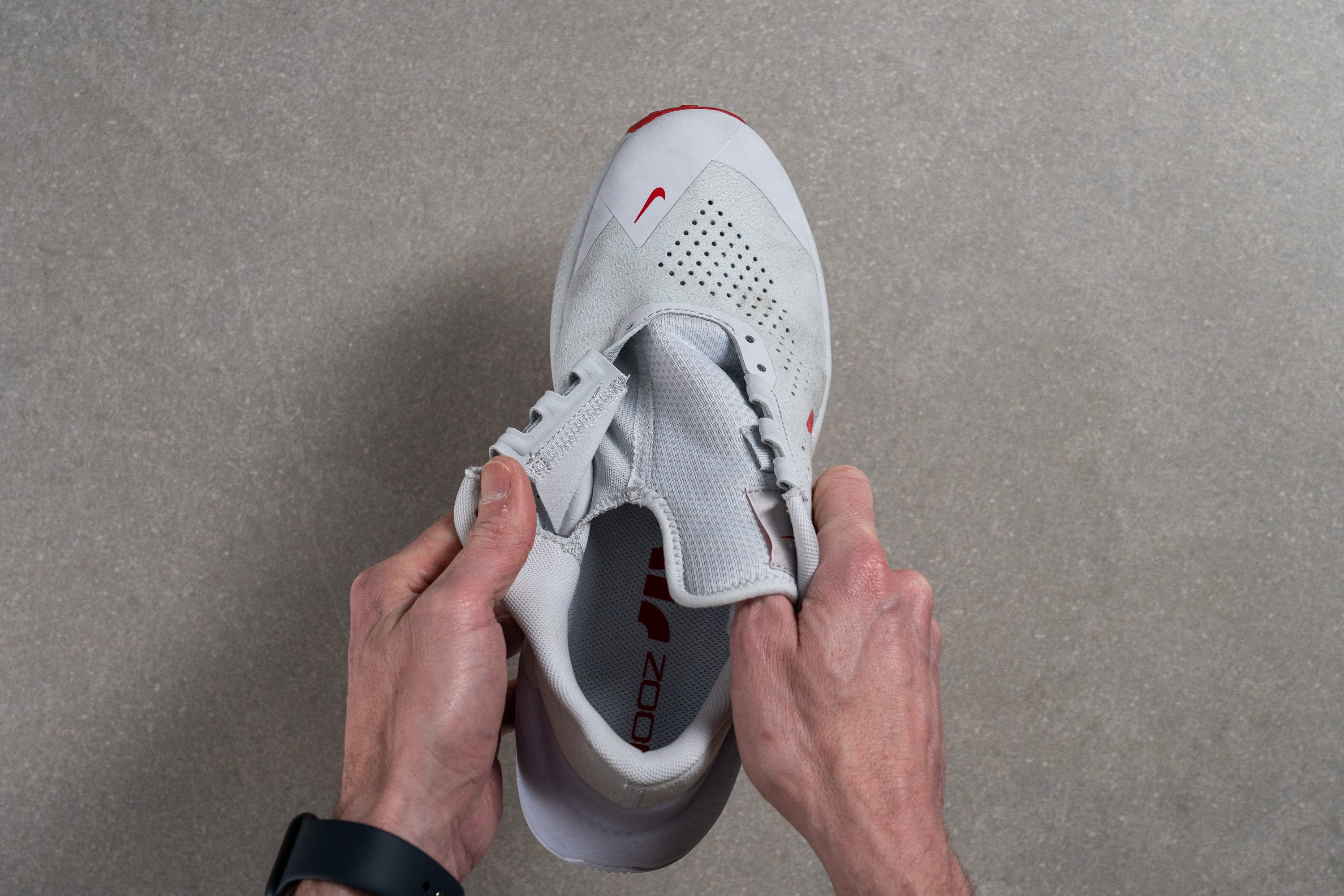
| Air Zoom TR 1 | Both sides (full) |
Heel tab
The Nike Air Zoom TR 1 did not have any heel tab, which should not be an issue since it was never difficult to put on or take off this Nike trainer.
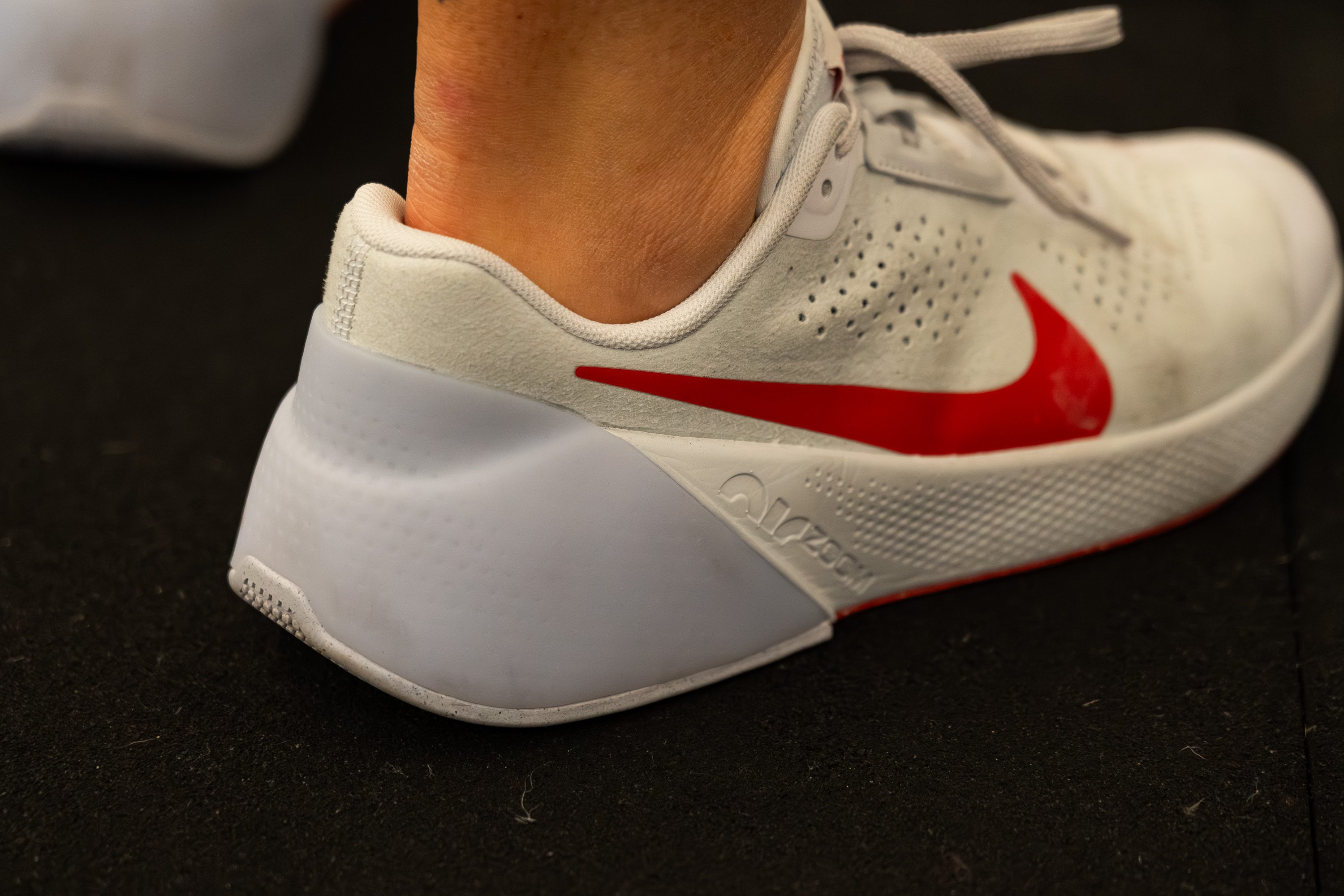
| Air Zoom TR 1 | None |

